Kitchen flooring has to put up with a lot. Between spills and drips, heat and dropped utensils, as well as plenty of foot traffic, the flooring in this space has to be able to handle multiple hazards and look good while doing it. Not every flooring material is well suited for this location, and some materials are more durable and require less maintenance than others. Balancing style, function, and comfort is the key to making the right choice. Here are 5 different flooring materials that are great options for your kitchen.
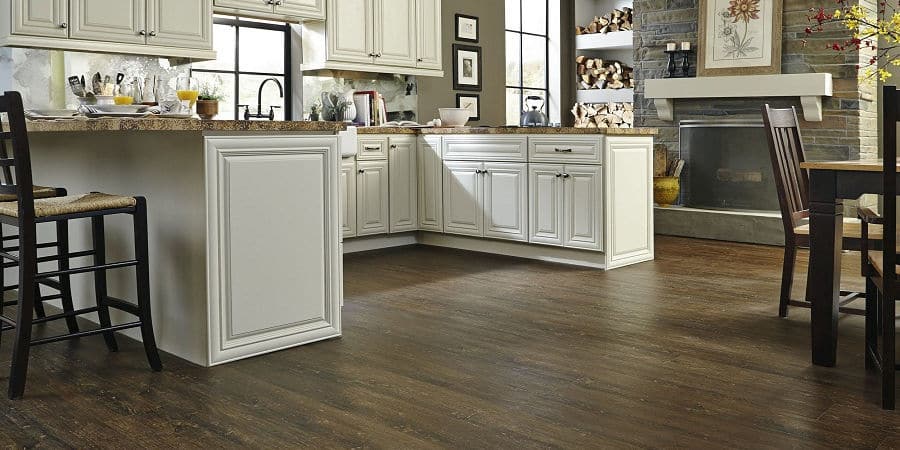
Vinyl
Vinyl is one of the easiest and most versatile kitchen flooring solutions. This man-made material is nearly impervious to stains, damage, and water issues, and cleaning it is as easy as keeping it free of stagnant water and debris with regular sweeping, vacuuming, or mopping. Vinyl continues to grow in popularity and is one of the most inexpensive flooring materials on the market. Because it is man-made, there are countless patterns to choose from that will definitely fit your style and budget.
Vinyl does not last as long as other floor coverings and can easily be scratched or torn, but there are longer lasting options like luxury vinyl tile or luxury vinyl planks that offer similar durability but longer lifespans.
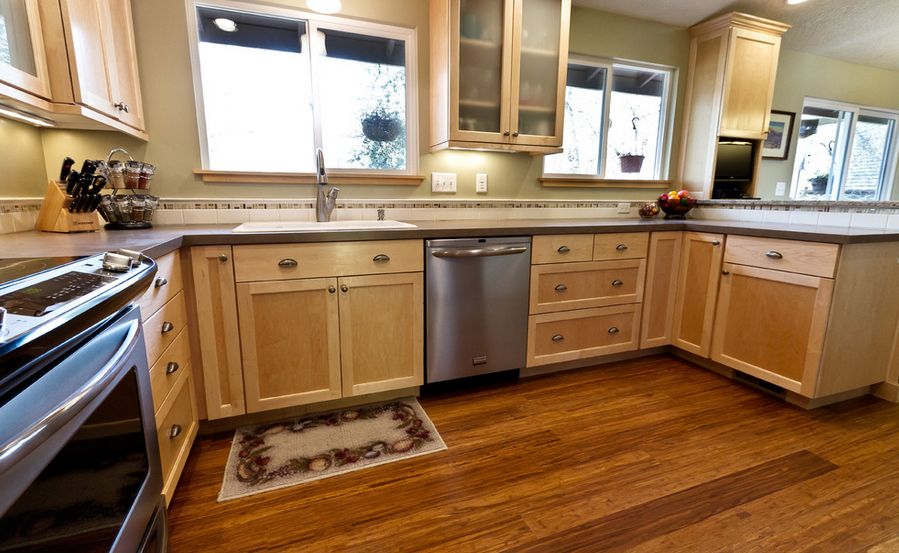
Bamboo
Bamboo is harder and more durable than hardwood, so we’ve included bamboo as our natural wood flooring choice for kitchens. The manufacturing process for bamboo makes the material more water resistant, making it an increasingly popular choice. For kitchen flooring, the durability of bamboo is much more favorable than hardwood.
The two downsides to bamboo flooring are both expense related. It is more expensive than hardwood upfront and it is more expensive to refinish. If well kept, refinishing will not need to happen often, but just like hardwood, refinishing bamboo can be pricey.
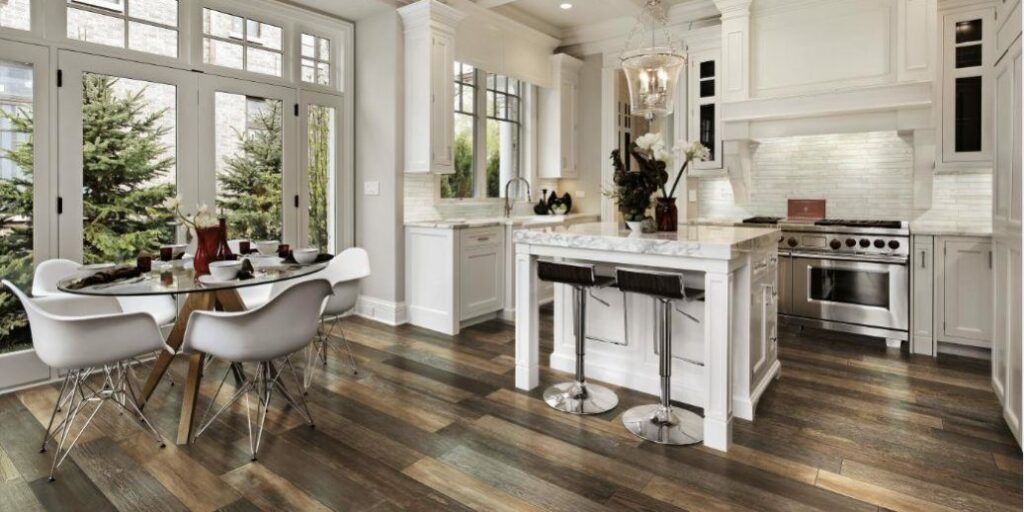
Ceramic Tile
Ceramic tile is a material made from natural clay that is shaped, glazed, and fired under heat. It is an extremely durable flooring material and impervious to water and stains. Ceramic tile—including porcelain—is resistant to heat and breakage, and under normal conditions, it can last indefinitely with little change to its appearance or function over time. Ceramic tiles are also available in numerous colors, faux natural patterns, as well as sizes, shapes, and even mosaics, giving you a wealth of design options.
Ceramic tile can be somewhat cold underfoot, though this can be remedied with a radiant heating system installed beneath the tiles. Some find ceramic tile to be too hard, so it’s common to use area rugs near places like the stove and kitchen sink where it’s common to stand still for extended periods of time.
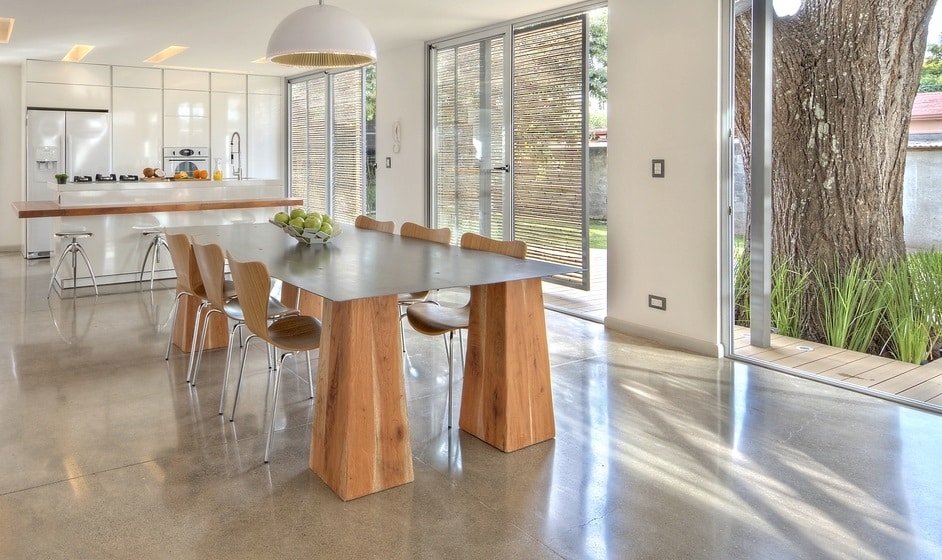
Concrete
If you have a ground-level kitchen with no basement, concrete can be another inexpensive and long-lasting option for you. In some cases, a concrete slab will already be in place beneath existing floor coverings. Concrete can be polished, stained, or treated in a variety of ways to make it a very stylish and attractive kitchen floor. Concrete floors are especially popular in modern-style kitchens.
Similar to ceramic flooring, concrete floors are somewhat cold and unforgiving underfoot. The look of concrete flooring is not for everyone, so some see concrete floors as a drawback when it’s time to sell your home.
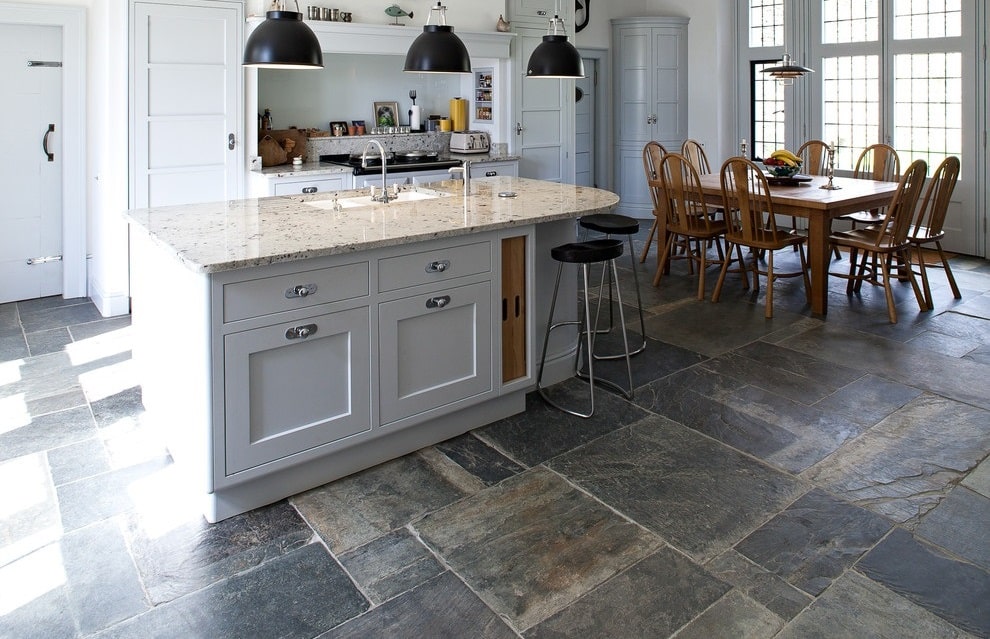
Natural Stone Tile
Just as you’d expect, natural stone is a durable, long-lasting flooring solution for the kitchen. Natural stone flooring options include marble, granite, slate, limestone, travertine, and sandstone. Marble and granite in particular are very luxurious options due to their natural veining, and they usually add that luxurious value and look to the home.
Not all stone is the same, but the biggest drawback to natural stone is that it is porous and therefore susceptible to water and liquid stain penetration, a common problem in the kitchen. This can be avoided with a high-quality stone sealer applied on a regular basis.
Contact Weaver Carpets
The professionals at Weaver Carpets would love to guide you through the kitchen flooring process for your Denver home. We have two locations on either side of Denver where we would be happy to show you some options and narrow your choices.
Contact Weaver Carpets today to get started!
Light and dark flooring can make the exact same space look completely different. Each tone comes with its own advantages and disadvantages, so it’s important you decide what is most important to you if the choice is not obvious. Below are the pros and cons that come with light and dark flooring. We highly recommend meeting with a flooring professional to make your final choice.
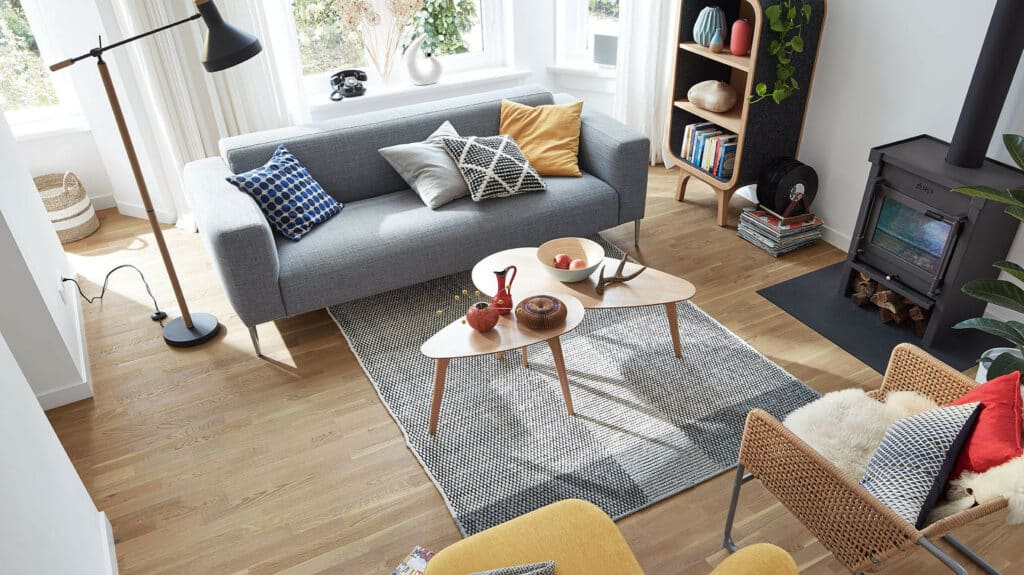
LIGHT FLOORING
Pros
- Makes spaces brighter and feel more open
- Easier to style
- Hides dust, hair and minor damage
Cons
- Too bright in overexposed rooms
- Shows stains
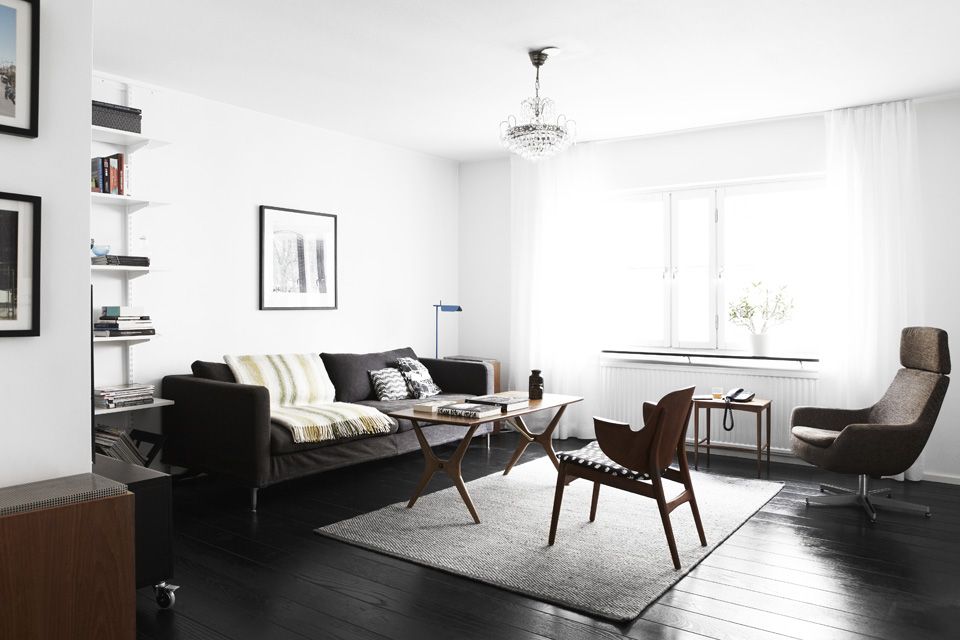
DARK FLOORING
Pros
- Cozier, more modern feel
- Absorbs light, less prone to fading
- Hides darker debris
Cons
- Makes room feel smaller
- Shows dust and light debris
Contact Weaver Carpets
At the end of the day, the choice is completely up to you and should complement your space and style. We highly recommend meeting with a professional flooring contractor to get information custom to your wants and needs and you can even get a few flooring swatches to see how your top choices look in your space.
If you are in the Denver Metro Area, Weaver Carpets would love to help you choose and install your brand-new floor. We offer wholesale flooring, so you can be sure you are getting the best deal. Contact us today!
From types of tile to layout patterns, there is a seemingly endless number of options that can make the process of choosing a tile floor quite overwhelming. If you’ve decided on tile for your flooring, you have already made a great decision that you should be proud of. Now it’s time to make a few more decisions before enjoying your brand new tile floor.
Below are the basics of the different types of tile on the market, how they differ, and why they’re popular. While articles like this exist to give you some extra insight, we highly recommend speaking with a professional to get a recommendation specific to your needs, space, and lifestyle.
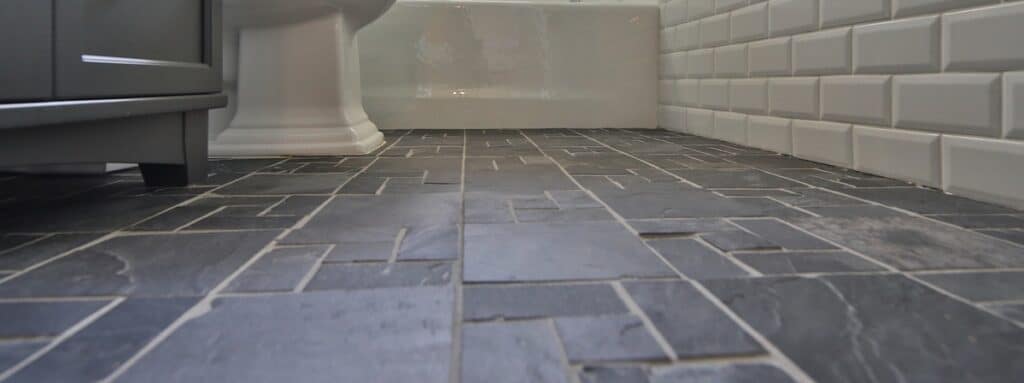
Natural Stone
Natural stone has been a popular flooring choice for centuries. Natural stones feature variations in color and pattern making stone floor tiles beautiful and completely unique. Natural stone tile is made from materials like marble, granite, limestone, travertine, and slate. With periodic sealing and polishing, natural stone will last forever. Because natural stone is not man-made, it tends to be a more expensive option.
Marble is durable, easy to clean, versatile, and gives your room a look of refined elegance. Although available in a variety of colors, classic marble tile is typically white or off white with gray to black veining.
Granite is a highly durable, hard and dense rock and a good option for countertops and floors. Granite resists scratching when polished. With its unique veining and specks of minerals, granite is a classic and distinctive look and a great choice for kitchens and bathrooms.
Limestone has a luxurious look and feel. Limestone is a soft, porous rock characterized by its earthy appearance and can be polished or textured. Limestone gives your room a look of classic luxury.
Travertine, a type of limestone, is characterized by classic neutral colors and unique natural patterns. Travertine provides a look of soft, natural, earthy tones.
Slate is extremely dense and durable and generally comes in darker tones. Slate is naturally textured, but can be honed to a smooth finish. Slate is a good choice for kitchens and high traffic areas and can also be used in outdoor areas. The richness of slate gives your room a look of classy elegance.
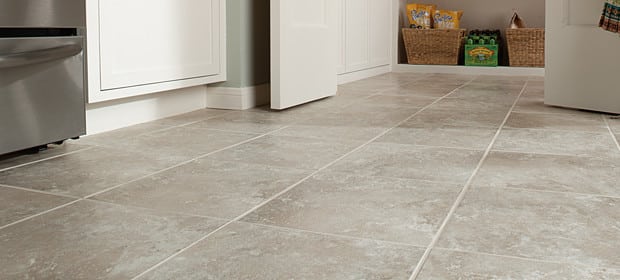
Ceramic Tile
Ceramic tile is durable and because it’s man-made, comes in a myriad of styles, colors, and finishes. Ceramic tile is made from clay, molded, and kiln dried at high temperatures. Color glaze is added prior to a second firing to give ceramic tile its color. Ceramic tile is a budget-friendly tile choice. Ceramic tile can be glazed to matte, semi-gloss, or high gloss finishes.
Quarry tile is a sustainable, natural product made from clay and shale. Quarry tile is durable and easy to clean and features red and brown hues. Quarry tile is modestly priced and can be used outdoors as well as indoors.
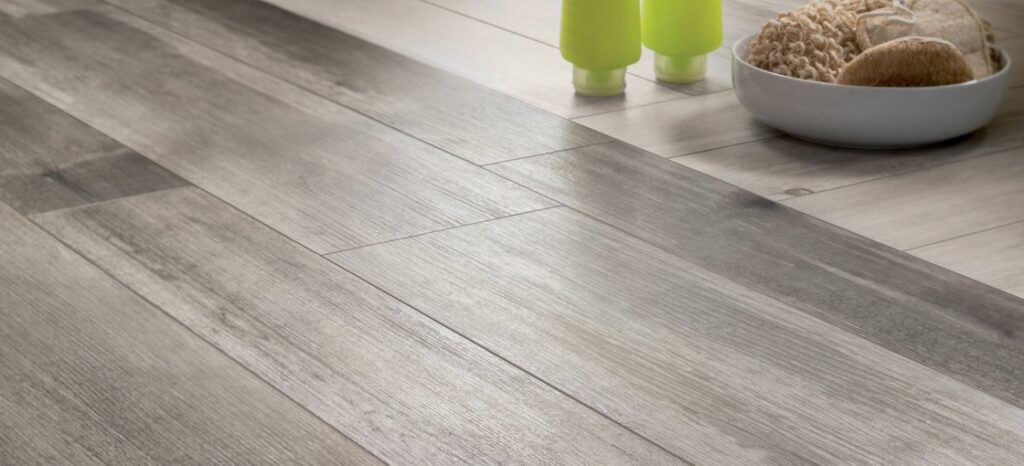
Porcelain Tile
Porcelain tile is made from a mixture of clay and feldspar fired at a very high temperature, resulting in a highly durable, moisture resistant tile. Porcelain tile is not only a great choice for flooring, but it’s also a great choice for walls. Available in numerous colors, sizes, and textures, porcelain tile is a beautiful, durable, long-lasting option.
Please read our Porcelain vs. Ceramic Tile article for more information on the biggest differences between these two popular types of tile.
Contact Weaver Carpets
Whether you need more help deciding or you are sure of your tile choice, the professionals at Weaver Carpets would love to guide you through the tile flooring process. We have two locations on either side of Denver where we would be happy to show you some options and narrow your choices.
Contact Weaver Carpets today to get started!
Vinyl flooring has quickly become the most popular flooring choice for both homes and businesses and it’s easy to see why. Whether you choose luxury vinyl tile (LVT), luxury vinyl plank (LVP), or traditional vinyl flooring, every advantage still applies. Below are just 5 of the many reasons why you should choose vinyl flooring for your home or business.
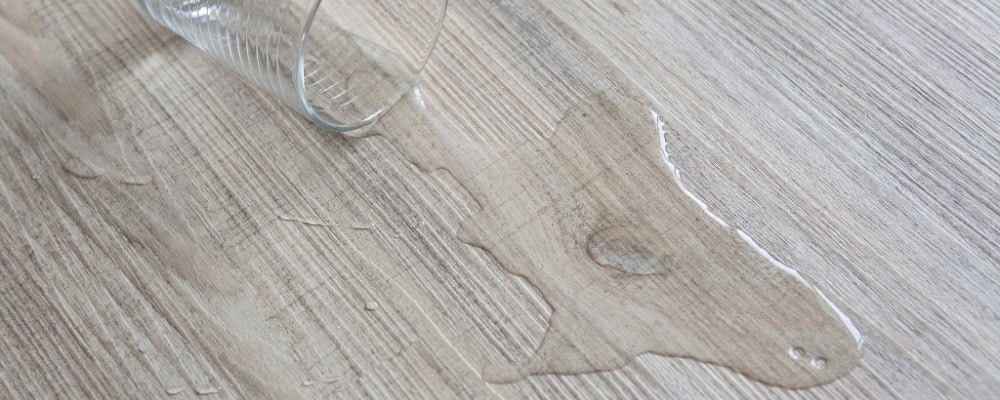
1. Durability/Moisture Resistance
Vinyl is considered to be a very durable flooring option, especially when well-maintained. Vinyl floors come with a wear layer which contributes to its long lifespan, even in high-traffic areas of a home or office.
Even better, vinyl floors are one of the only moisture resistant flooring types on the market. Unlike carpet, tile and hardwood, vinyl sheets/planks/tiles and their PVC backings are waterproof, making this a perfect flooring choice for spaces that often get wet, like the kitchen, bathroom, or laundry room.
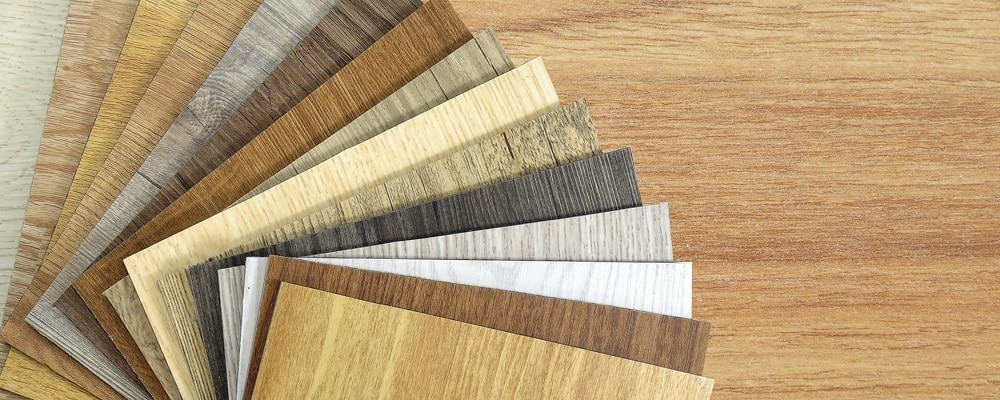
2. Abundance of Options
Unlike the vinyl flooring popular in the 70’s, the vinyl available today comes in a wide range of colors, patterns and even textures to fit any space. The most popular of these choices is vinyl flooring that resembles natural wood flooring. This vinyl comes at a fraction of the cost, is significantly more durable and requires a small fraction of the maintenance.
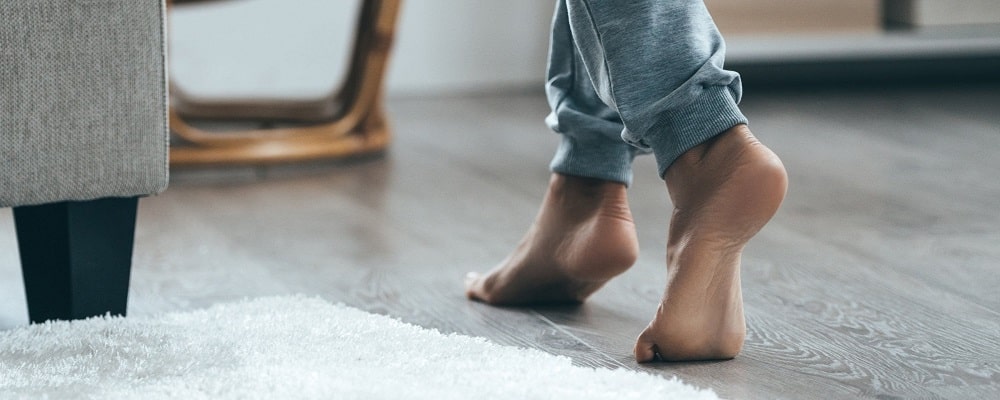
3. Comfort
Vinyl does not get cold, making it a great option for homes in cold climates. Vinyl floors are also installed with a cork or foam backing which provides a thin layer of insulation and a bit of ‘give’ when walking on it. With flooring types like tile and hardwood, there is zero give, making it hard on your feet and back.
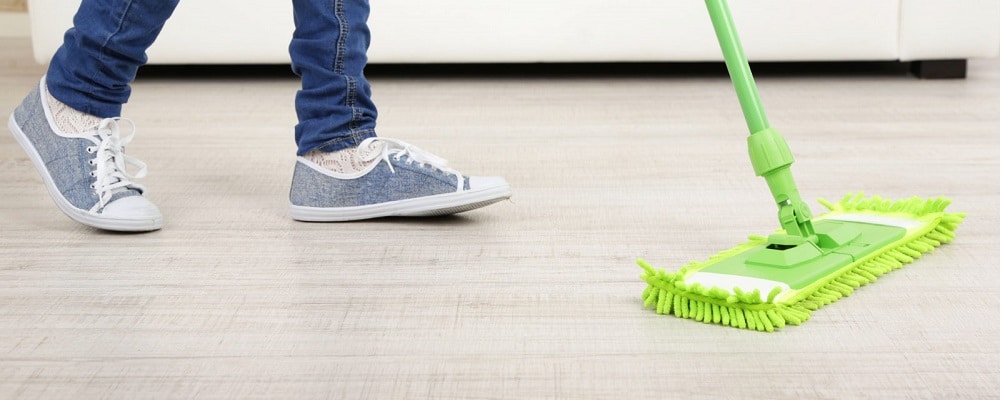
4. Low Maintenance
One of the biggest appeals of vinyl flooring is the low maintenance. Because vinyl is so durable and water resistant, these floors will last a long time with very little maintenance and upkeep. Regular sweeping and mopping is all it takes to keep vinyl floors in top condition.
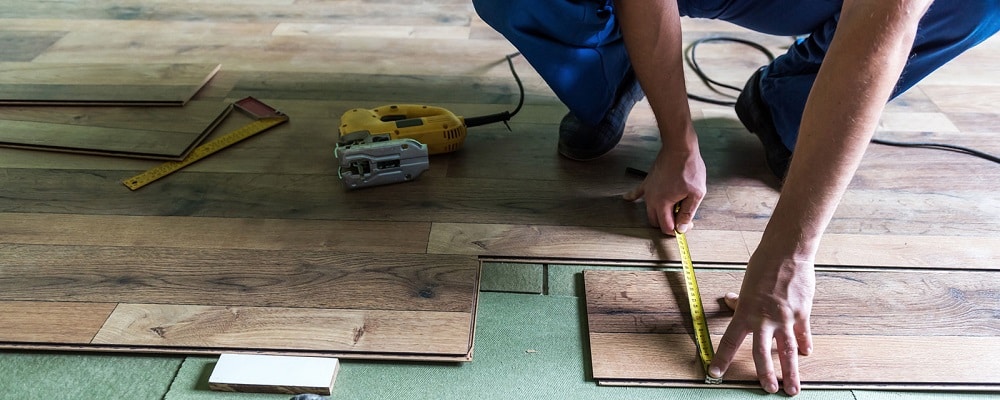
5. Affordability
Like most types of flooring, there are plenty of low and high-end vinyl flooring options. Vinyl might seem more expensive upfront, but vinyl lasts much longer and is more durable than most flooring types which saves you money over time.
Of the vinyl options, sheet vinyl is the least expensive. Though there are less options when you choose sheet vinyl, it still carries all the benefits of vinyl flooring mentioned above. The drawbacks of sheet vinyl are less options, a shorter lifespan and difficult to repair.
Are you interested in vinyl flooring for your Denver home or business? Contact us today! We have two showrooms on either side of Denver where we would be happy to show you your LVT, LVP and vinyl flooring options.
As a landlord, you want the flooring in your rental property to be durable, long lasting, cost effective, and neutral. Replacing flooring can be a huge expense, so we want to make sure you have all the information you need before you make your choice. Here are our top four flooring material recommendations for rental properties.
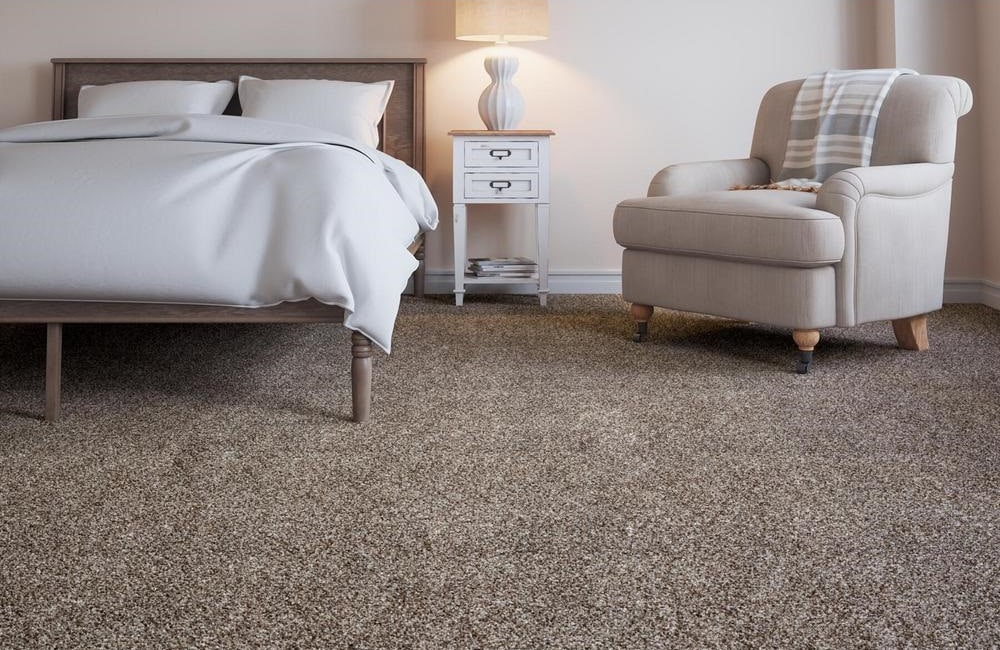
Carpet
Our #1 choice for rental property flooring is carpet flooring (we promise this is not because carpet is in our name). While carpeting cannot and should not be installed throughout an entire rental property, carpet is perfect for spaces like the living room, bedrooms, stairs, and second floor hallways. Carpet flooring has countless benefits specific to rental properties, including:
- Sound absorption— besides cork flooring, carpet flooring is by far the best sound absorbing floor available. This is great for your tenants and their neighbors if the property is an apartment or townhome.
- Wide range of colors and textures— the wide selection available allows you to pick carpeting that will easily hide small stains and will match the existing decor.
- Good insulator— can help cut down energy bills.
- Simple, widely known maintenance— just about everyone knows how to take care of carpet flooring. Other types of flooring like hardwood and laminate require more specific, routine maintenance.
There are a few drawbacks of carpeting, the biggest being pet hair, stains and odor. Carpet easily retains odor and after a few pet stains the carpet and padding will likely need to be replaced. The other disadvantage of carpet flooring is it is difficult to clean and should be deep cleaned every year.
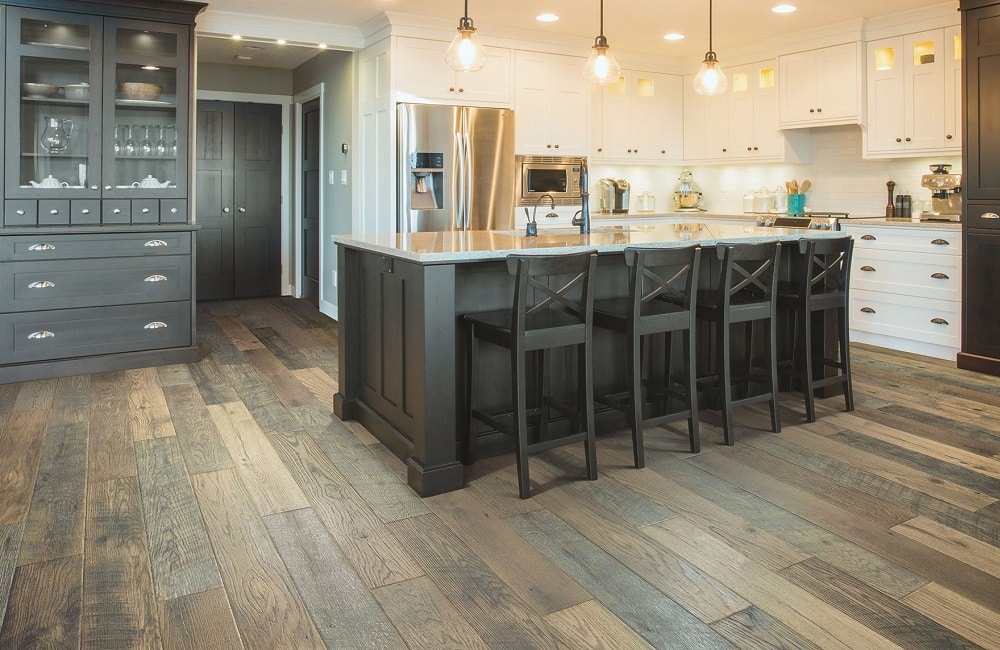
Luxury Vinyl Tile (LVT)
LVT is a close second choice for rental property flooring. LVT is a very popular flooring choice and continues to grow in popularity because it is durable, water resistant, easy to install and easy to clean. Due to its water resistance, it’s the perfect flooring choice for kitchens, bathrooms and laundry rooms. Even better, LVT can last up to 20 years saving you lots of money as other repairs are made.
The downfalls of luxury vinyl tile floors are they are a hard surface so they can be quite loud. In addition, LVT can get expensive depending on the style you choose. Thankfully LVT lasts quite long, but the upfront cost is higher than other flooring options.
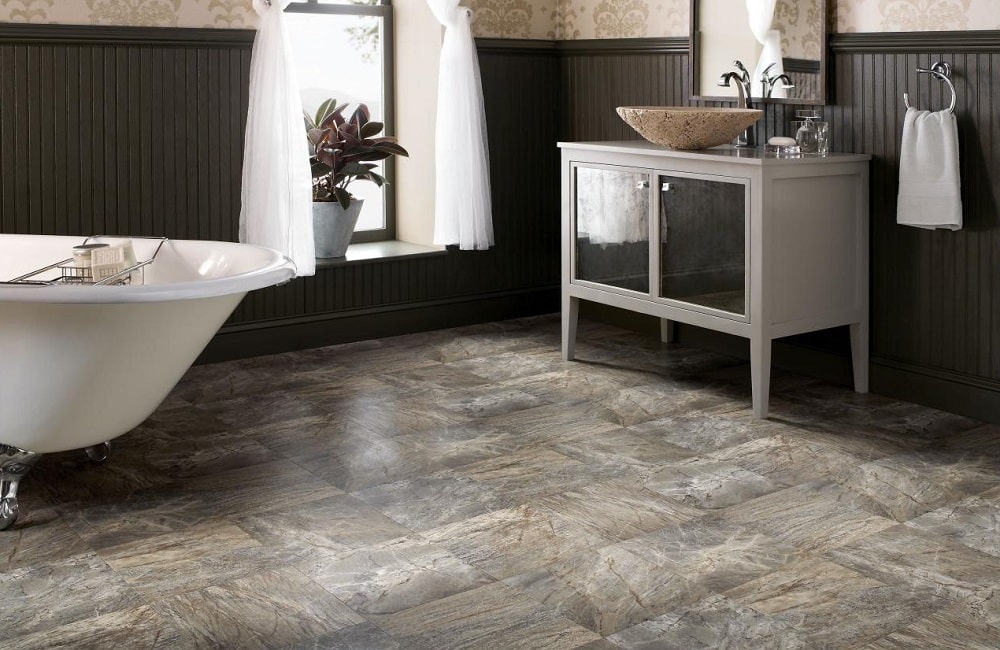
Vinyl
Another popular option is vinyl flooring. Vinyl is moisture resistant, making it a good choice for kitchens, bathrooms and laundry rooms. It is installed with a layer of padding underneath, making it softer to walk on and a bit sound absorbing. Vinyl flooring is also easy to clean and very affordable, so it’s commonly seen installed throughout the entire main level of rental properties (with the exceptions of bedrooms). It comes in a wide range of colors and patterns, from faux tile to imitation wood.
Vinyl can be gouged by sharp objects or ripped if furniture is dragged across it. Nicks, rips and cuts can’t really be repaired in sheet vinyl, while vinyl tile fares better. Because it is inexpensive, vinyl doesn’t do much to boost a property’s resale value.
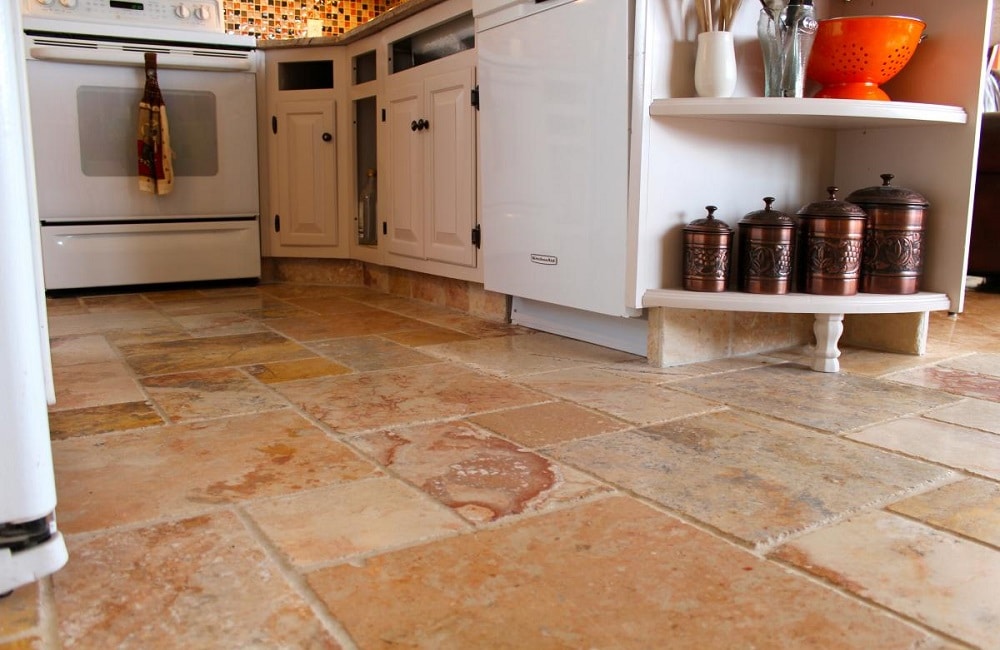
Tile
Durable and long-lasting, tile flooring is an excellent option for kitchens and bathrooms. It’s waterproof and fairly easy to clean depending on the material. Ceramic tile in particular is impervious to scratches and holds up well in high traffic areas. Tile comes in many sizes and colors, giving landlords plenty of design options.
Tile floors are very hard, so they are not as comfortable to walk on and have no sound-absorbing properties. Also, many people dislike the cold feeling underfoot, especially in the winter. Tile is also one of the more costly flooring options and if something heavy drops onto them, repair is difficult.
We recommend contacting a professional for recommendations specific to your property. If you are in the Denver Metro Area, we have two showrooms where we’d be happy to show you your options in person. We offer wholesale flooring so you can be sure you are getting the best deal.
People often question the differences in price, durability, and lifespan of porcelain and ceramic tile, and how that affects what space the tile is appropriate for. From how they are made to the differences in their durability, here is all the information you need before you make your choice between porcelain and ceramic tile.
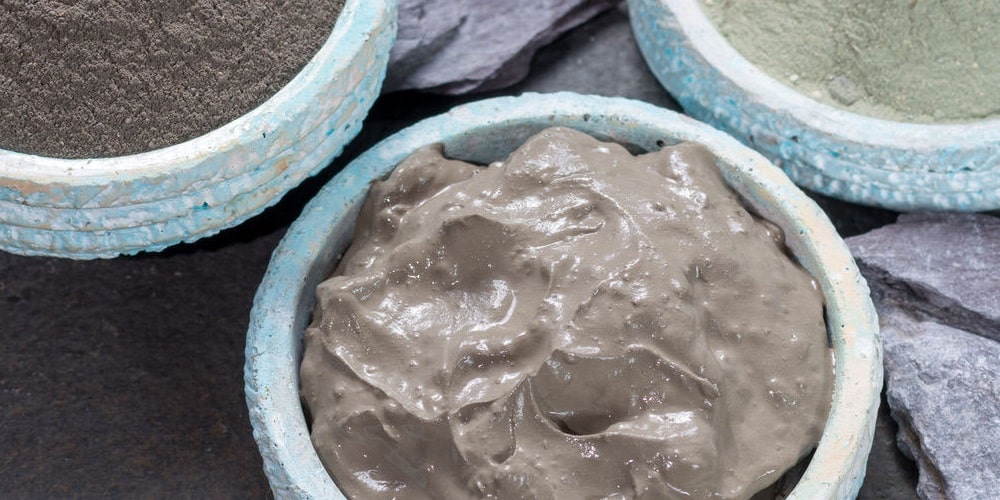
How They’re Made
Porcelain tile is made of finer clays and dust, and it’s fired at a higher temperature. This makes porcelain tile denser and more durable than ceramic, making it great for outdoor areas and generally a more expensive option. Both porcelain and ceramic are made from a clay mixture, kiln fired and transformed into a variety of styles.
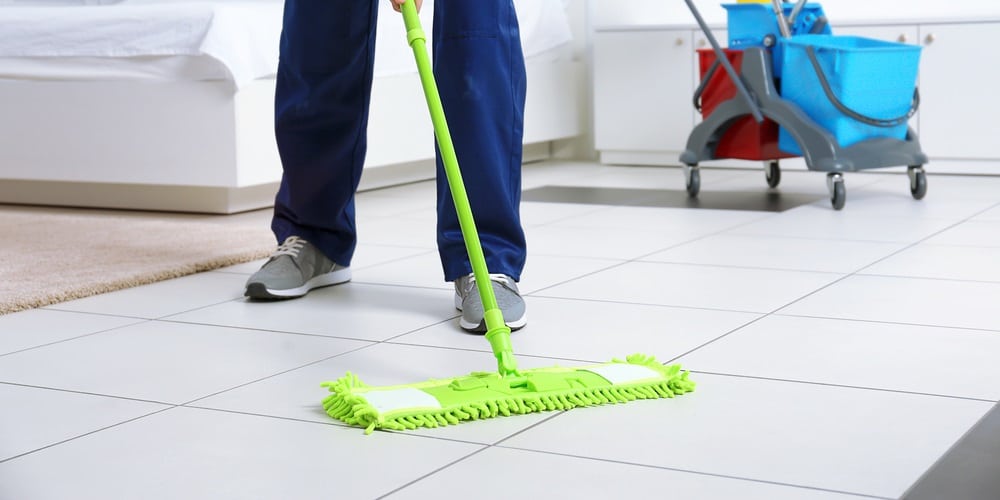
Cleaning & Maintenance
Because porcelain tile is more dense, it is less porous and therefore more water and stain resistant. Ultimately, the liquid and stain absorption of the tile greatly depends on the porousness of the glaze. For all tile and really all flooring types, it is important to clean up potential stains immediately and not let water sit on the surface too long.
In terms of cleaning, there shouldn’t be much of a difference. When you clean both porcelain and ceramic tile, you are preserving the glaze and grout. We recommend sweeping often and mopping with a mild detergent. Click here for more information on how to clean tile flooring, tile backsplash, shower tile, and tile grout.
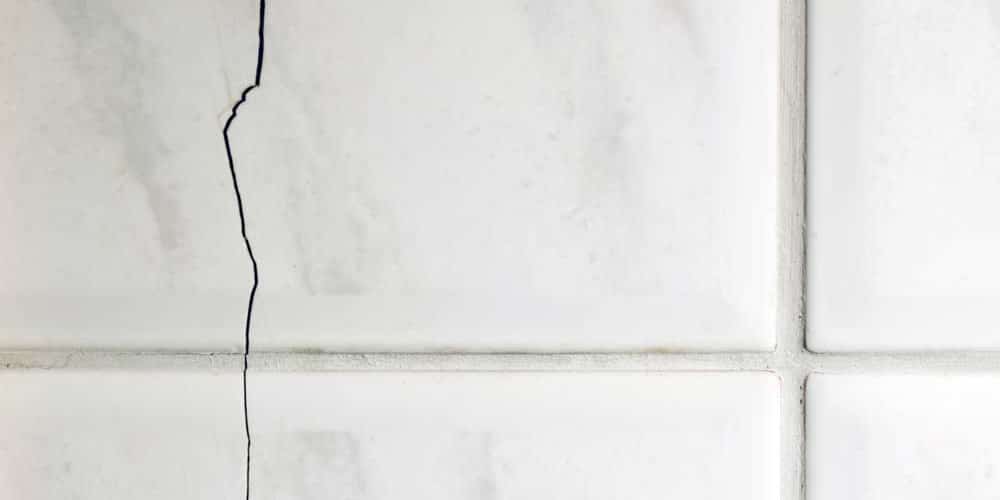
Durability
Porcelain tends to be more durable, though both are well known for being very durable flooring options. Due to its density, porcelain tiles are harder to break and can better withstand heavy use over time. For outdoor, high traffic, or commercial spaces, porcelain tile is usually the better option. For indoor, non-commercial spaces, both ceramic and porcelain are great choices.
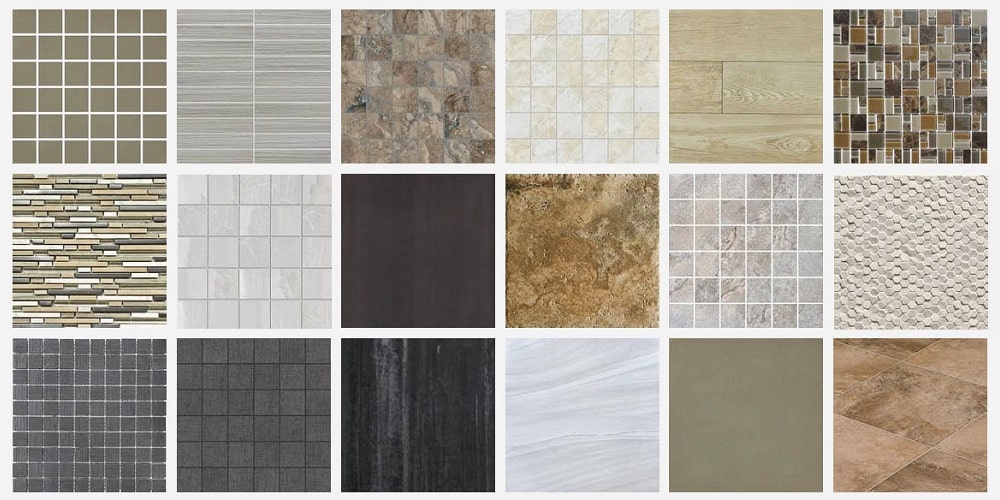
How to Choose
As mentioned above, if you are installing tile in a commercial or outdoor space, porcelain tile is often the best choice. For bathrooms, hallways or kitchen backsplashes, you will want to choose tile specifically made or rated for that space. For example, if you want subway tiles in your kitchen, there are wall-rated tiles—often made of porcelain—created precisely for that application.
The best way to decide on the tile for your project is to work with a professional and see all your choices in person. If you are in the Denver Metro Area, we have two showrooms where we’d be happy to show the best options for your project and help you decide.
Do you need new tile in your Denver home or business? Contact us today! We offer wholesale flooring so you can be sure you’re getting the best product at the best price.
From soap scum in the shower to cooking grease in your kitchen, we know tile and grout can be very difficult to clean. On top of that, you don’t want to use the wrong product or scratch your tile and cause permanent damage. Let us help you with these tips on how to restore the original beauty of your tile and how to clean grout so you can reclaim the space!
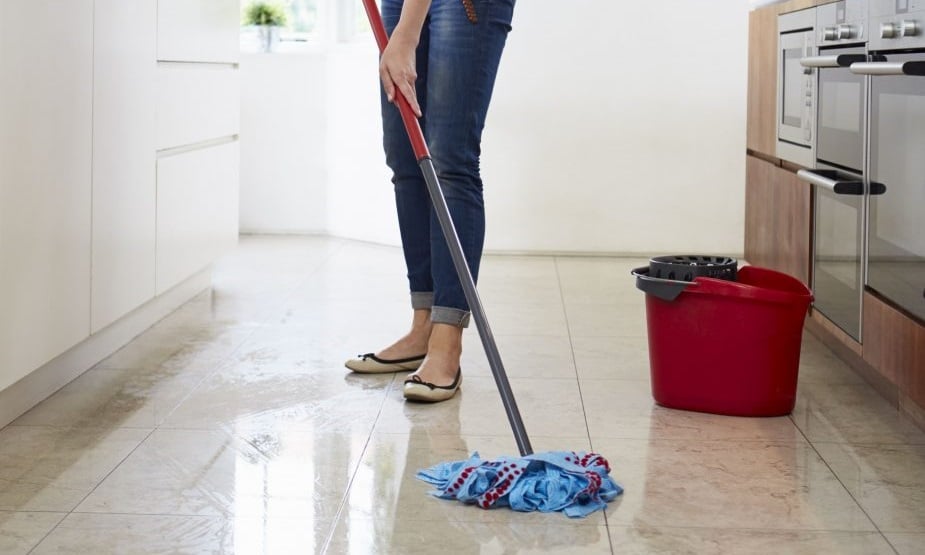
How to Clean Tile Flooring
The first thing you want to remember when looking for the best way to clean your ceramic or porcelain tile floors is that routine care and maintenance is important. This includes sweeping or vacuuming regularly to remove dirt and debris before it has a chance to get embedded in the tile or grout. Here are some additional tips and tricks on how to properly clean your tile floors:
- Do not use a straw broom that will scratch the surface of the tiles.
- Use a rag or chamois type mop instead of a sponge mop as they tend to push dirty water into the grout lines and could make them harder to clean.
- Mop the floor with warm water on a regular basis and be sure to dry it right afterwards to avoid any new dirt from quickly setting into wet areas and becoming hard-to-remove later.
- For a deep clean, check with the manufacturer or your local home improvement store for the best cleaning solution so you don’t risk damaging the tiles.
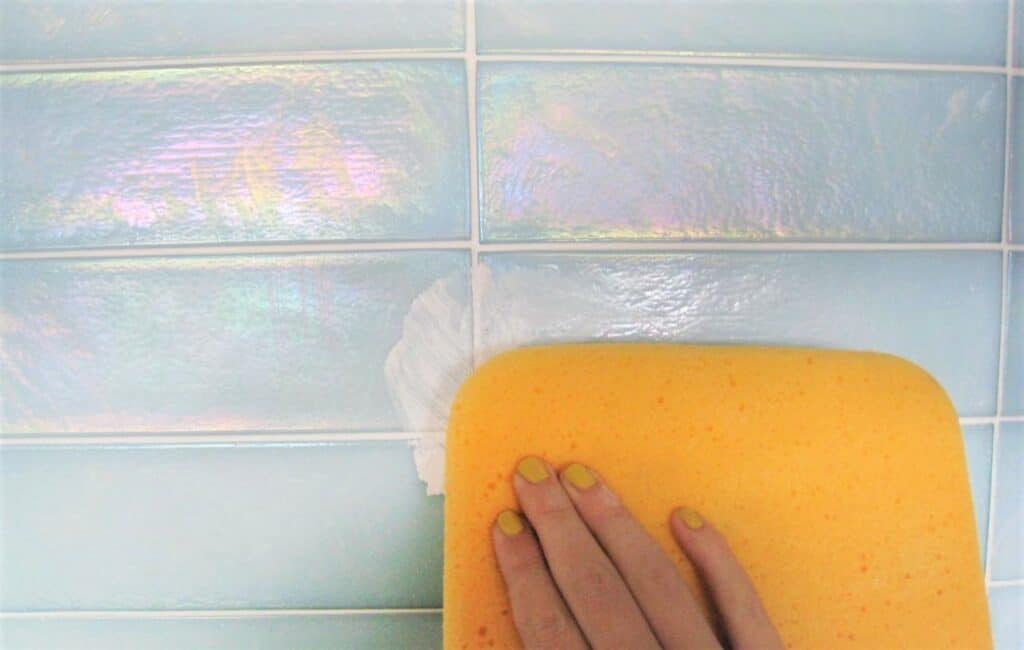
How to Clean Kitchen Backsplash Tile
Backsplash designs have definitely evolved but their function remains the same – to protect your wall and make it easier to clean up splatters from the stove. Those stove splatters can build up overtime and make your once desired focal point an eyesore. It is important to note that different backsplash materials require different cleaning techniques and solutions, and it is always advised that you check with the manufacturer for the right cleaners to use. Here are a few additional things to consider when cleaning your tile backsplash:
- Always blot away grease or food splatters as soon as it happens (when possible); the longer those splatters and stains sit, the harder they will be to remove later.
- Clean the backsplash regularly with some warm water to help soften the grime followed by a quick wipe down of the area with a sponge soaked in soapy warm water.
- For a deep clean, use the manufacturer recommended chemical solution that is safe for your tile and grout. You should typically let the solution sit on the backsplash for 5-15 minutes depending on the amount of grease on the surface. Use a soft-bristle brush or sponge to finish cleaning the area.
- Always dry backsplashes after cleaning to avoid any water streaks or mildew growth.
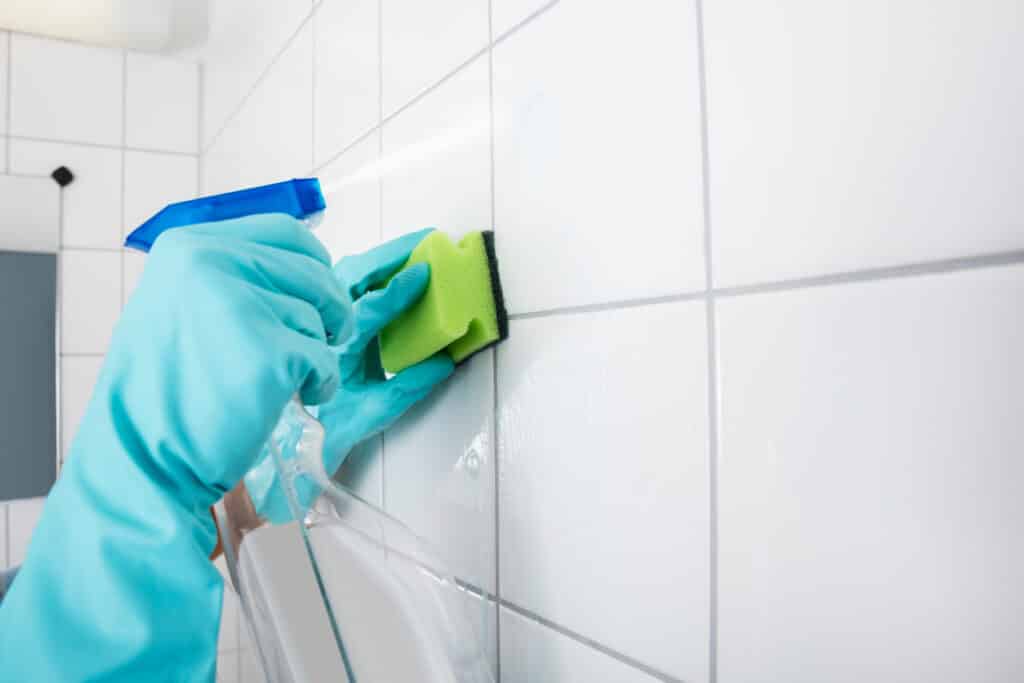
How to Clean Shower Tile
Between the everyday use and the naturally damp environment, shower tile can become very unsightly and even bad for your health. Thankfully, cleaning shower tile is simple but could take a bit of time depending on the amount of dirt present and size of the shower. Here are the best ways to clean your shower tile:
- Mix equal parts distilled white vinegar and water and spray the solution on the shower tiles.
- Let sit for 5-15 minutes depending on the amount of soap scum or mildew present and use a soft-bristle brush or sponge to scrub the area and rinse with warm water. *Note: do not use vinegar on natural stone tile.
- For a deeper clean, make a thick paste with 1-part water and 3-parts baking soda and apply the paste with a sponge. Spray the tile with the above vinegar solution. Use a soft-bristle brush or sponge to scrub the area and rinse with warm water.
Here are a few tips for how to maintain the beauty and cleanliness of your bathroom tile:
- After showering, leave the bathroom door, shower door/curtain and window open (if possible) to help reduce the humidity and minimize mold, mildew and the build-up of germs.
- Always leave bars of soap on a dish, never directly on the tile.
- Refrain from shower products that might dye the grout.
- Try keeping shower products elevated with a shower caddy or a shelf with drainage so excess water can run off.
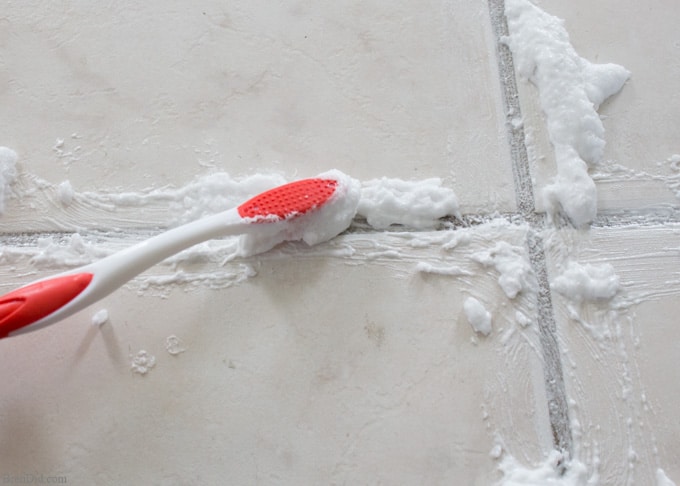
How to Clean Tile Grout
Grout is a porous substance that easily absorbs dirt, dust and grease and is thus prone to staining, soiling, and mold growth. Sealing the grout will help protect against all these things and it is recommended you re-seal grout every few years. Make sure you talk with your contractor about a sealer that is recommended for your tile.
Here is the best way to clean grout on a regular basis:
- Apply hot water to remove any surface dirt and grime before you spray on your grout cleaning solution.
- Apply your cleaning solution or make your own by combining 1-part water with 3-parts baking soda. After applying the paste to the grout, spray with a 1-part water and 1-part distilled white vinegar solution. *Note: do not use vinegar on natural stone tile.
- Let the cleaning solution sit on the surface for about 5-15 minutes depending on the level of grime, or if using the vinegar solution, wait until the solution stops bubbling.
- Scrub the grout with a soft brush (like a toothbrush) and rinse with hot water.
Do you need new tile in your Denver home or business? Contact us today! We offer wholesale flooring so you can be sure you’re getting the best product at the best price.
If you’ve decided on carpet flooring for your home, it’s good to know all your options when it comes to carpet texture. Carpet texture is not as simple as a scale from soft to rough; carpet texture options have to do with how the carpet is made and cut. Whether you want plush carpet in your bedroom or durable carpet for the kid’s room, knowing the texture you want before shopping will save you a lot of time.
Before we jump into texture options, it’s important to know how carpet is constructed. Carpet is made by repeatedly looping yarn through a backing material. The loops of yarn are known as the carpet’s “pile,” and various factors related to the pile determine the look and feel of the carpet—a.k.a. its texture. The loops can be short, long, twisted, cut, and even a combination to create a wide variety of texture options.
Here are 7 of the most popular carpet textures, what they mean, and how they differ in durability and feel.

Level Loop Pile

Level loop pile carpets have consistent, uncut loop piles, which create a tight overall texture without any distinct pattern or variation. The tightness of the loops means the carpet is less soft, but it also won’t show footprints or vacuum marks, making it a great option for more high-traffic areas and commercial office spaces.
Berber

Berber carpet can have several meanings, but traditionally, it’s a Level Loop pile made of thicker yarn that’s typically a neutral shade with flecks of color in it. It’s durable because the loops are not cut so it is great in high-traffic areas. Plus, the variation in color means it hides dirt and stains fairly well. Berber carpets retain dirt and are easier to damage than Level Loop.
Cut & Loop Pile

This type of carpet is popular because of its durability, resistance to crushing, and the fact that it’s a good option for spaces that get both low and high foot-traffic. Cut & Loop is a combination of cut and looped yarns which creates a nice patterned effect and surface texture.
Velvet & Plush

Velvet and Plush carpeting are types of Cut Loop piles that have a lighter twist, making the texture slightly plush or velvet best for low-traffic spaces. This is great for bedrooms and living rooms and will show traffic marks. Area rugs commonly use this pile style.
Saxony

Saxony is another type of Cut Loop carpet that features longer pile lengths, making it deep and soft. This carpet texture is made up of densely packed, twisted piles that stand straight up. Because of their height and uniform direction, they easily show footprints and vacuum marks.
Friezé

Friezé is similar to Saxony in that it’s a longer Cut Loop pile, but it tends to be more casual because the tightly twisted piles lie in multiple directions, creating a less uniform look. The carpet is still dense and soft, but it works well in high-traffic areas because footprints and vacuum marks cannot be seen. When Friezé piles reach a certain length, they’re considered shag carpeting.
Multi-Level Loop Pile

By combining piles of different heights, Multi-Level Loop offers a random texture which is great for high-traffic areas and office spaces. This is done to create a geometric pattern in a single or multi-color carpet, whether it’s stripes or diamonds or anything else. One downfall from Multi-Level Loop pile is the longer loops tend to hold more dirt.
Do you need new carpet flooring in your Denver home or business? Contact us today! We offer wholesale flooring so you can be sure you’re getting the best product at the best price.
How Long Does Laminate Flooring Last?
How long does laminate flooring last, and how can you extend the lifespan of your laminate floor? Below we tell you the average lifespan of laminate flooring and give you a list of ways you can protect your investment and make your floors last as long as possible.
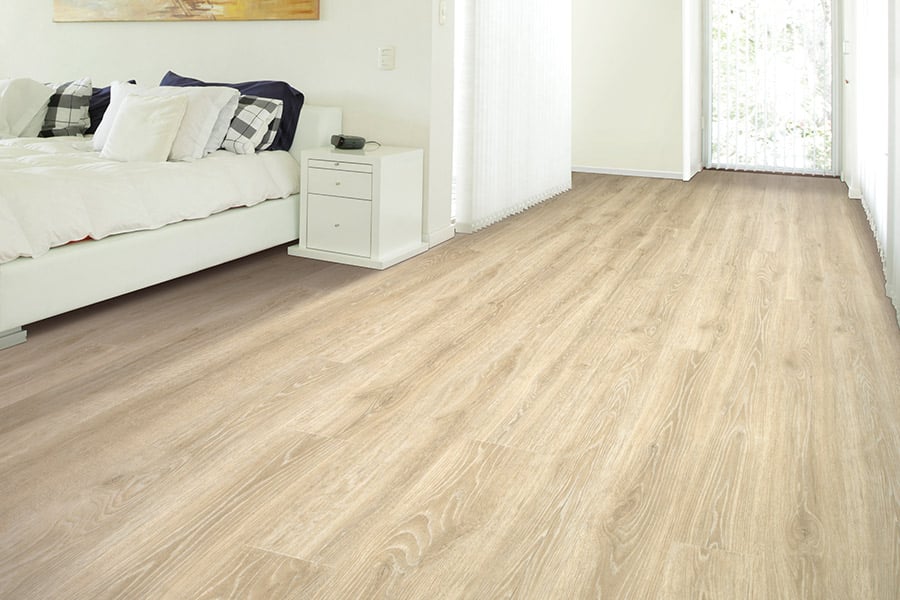
Laminate flooring consists of at least four layers, including a wear layer that protects the floor and makes it durable. With this wear layer along with proper care, laminate floors are very durable and can last up to 25 years.
The average lifespan for laminate flooring is between 15 and 25 years, but it can vary from as short as 10 years to as long as 30 years. The difference in life expectancy depends on the quality of the flooring, whether it was properly installed, the amount of traffic it receives and how well it’s maintained. Improper maintenance, such as using harsh cleaners or failing to wipe up spills, can reduce the floor’s longevity. Laminate flooring does not last as long as hardwood flooring, but hardwood floors require more maintenance and need to be sanded and refinished. Once the top layer wears away on laminate floors, it must be replaced.
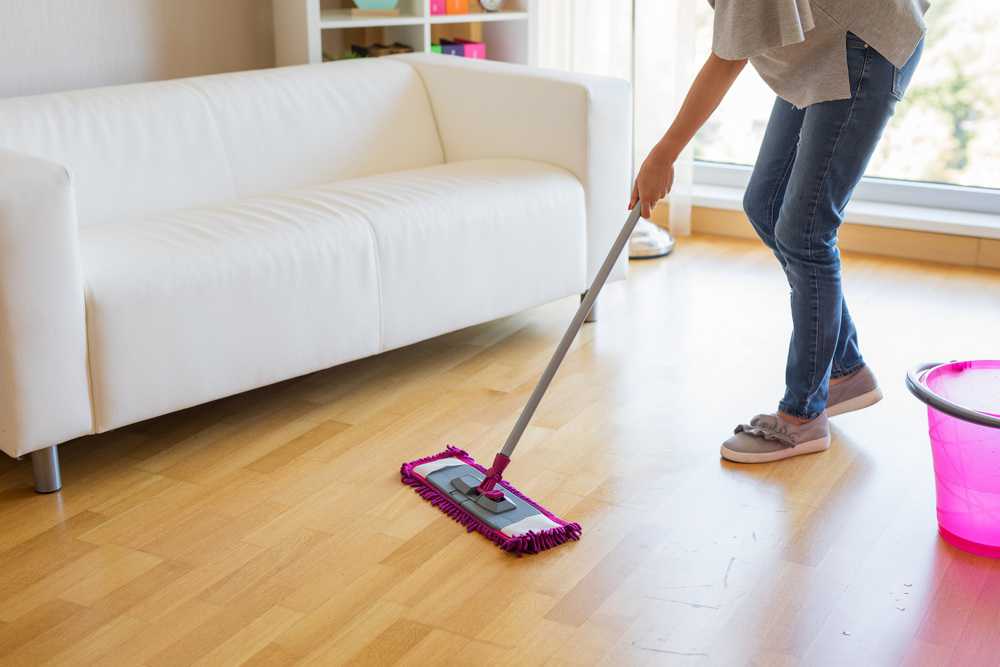
How to Extend the Life of Your Laminate Floors
- Frequent cleaning and stain remediation
- Periodically clean the floor with cleaning products made specifically for laminate floor care
- If mopping, use a damp mop so less water has the chance to seep in between your laminate seams.
- Use a damp cloth to blot up spills as soon as they happen. Never allow liquids to stand on your floor.
- Use a steam mop occasionally for a very deep clean. Not daily, though, because the repeated use of steam can cause the laminate to buckle.
- Do not use any type of buffing or polishing machine on your laminate floors.
- Avoid using steel wool, abrasive cleaners, or strong ammoniated or chlorinated cleaners.
- Replace warped or damaged planks.
- Place furniture pads under all table and chair legs.
Are you interested in laminate flooring for your Denver home or business? Contact us today! We offer wholesale flooring so you can be sure you’re getting the best product at the best price.
There’s a popular saying in Denver, “If you don’t like the weather, wait five minutes.” The weather changes so rapidly that our homes must always be ready for the snow boots, muddy paws, hot days, and cold days.
Here are the types of flooring we recommend for your Denver home, all of which are best for a constantly changing climate.
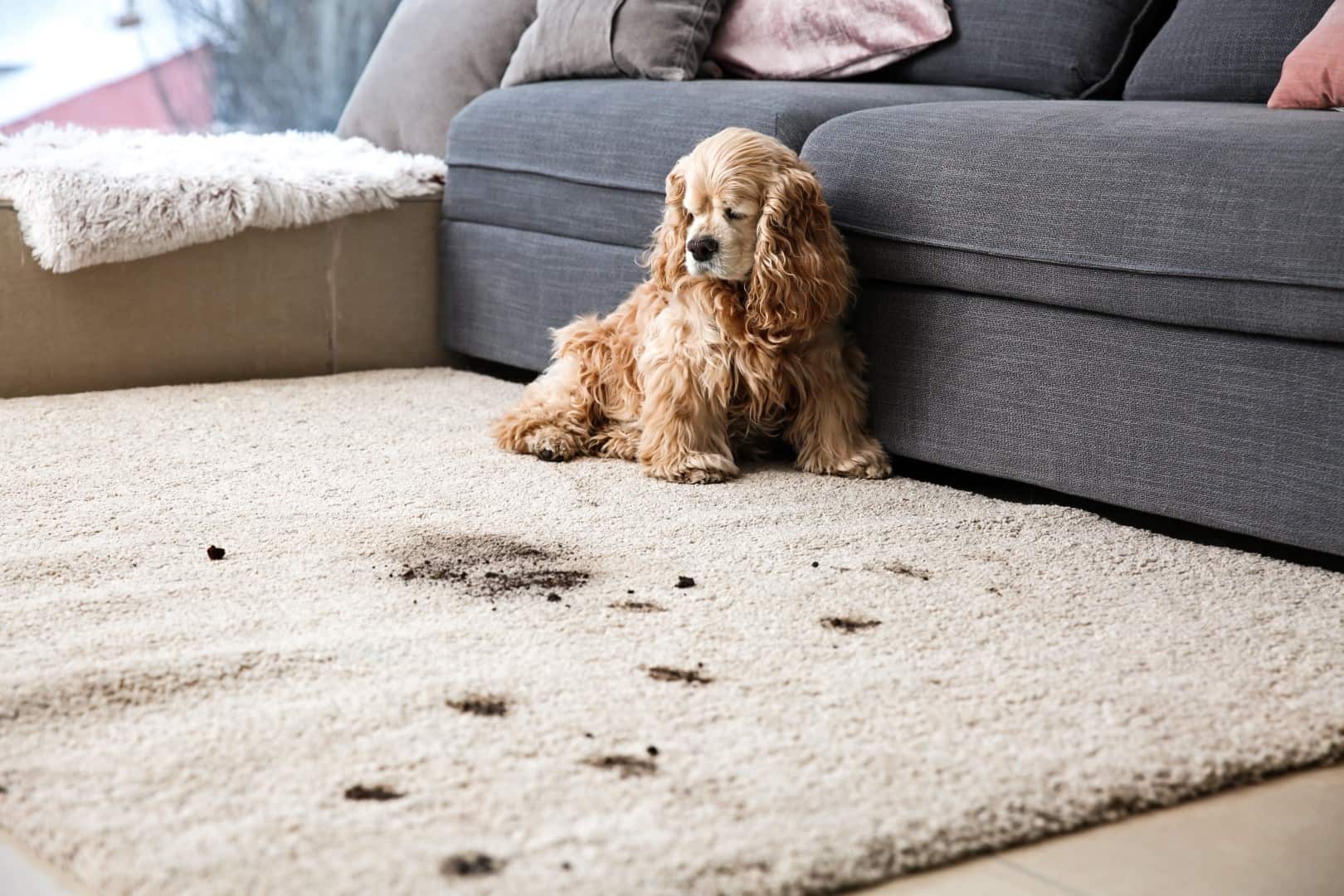
Stain-Resistant Carpet Flooring
Traditional carpeting will not last as long as stain-resistant carpeting in Denver. Stain-resistant carpeting will be ready for whatever your shoes or furry friends trek indoors. To go above and beyond, ask us about pet stain-resistant carpeting, a type of carpeting that is even easier to clean, resistant to pet hair and reduces odors.
In general, carpet flooring is great for regulating the temperature and is comfortable on your feet during the colder months. In new homes around Denver, many home builders and buyers are not putting carpet flooring in the living room, but still want carpeting in bedrooms and basements.
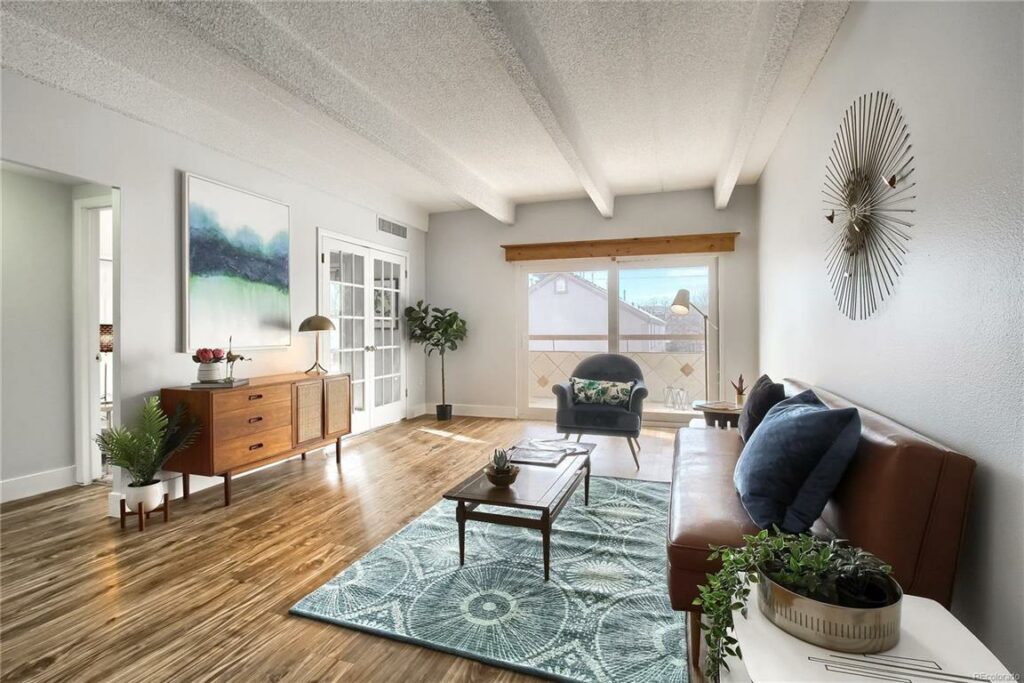
Luxury Vinyl Tile (LVT) Flooring
Luxury vinyl is the most popular product in the flooring industry today. LVT is resistant to water, mold, staining and scuffing which is the perfect floor for a Denver home. Even better, it’s easy to maintain and comes in a variety of patterns and textures so it can even be made to look exactly like hardwood floors at a fraction of the cost.
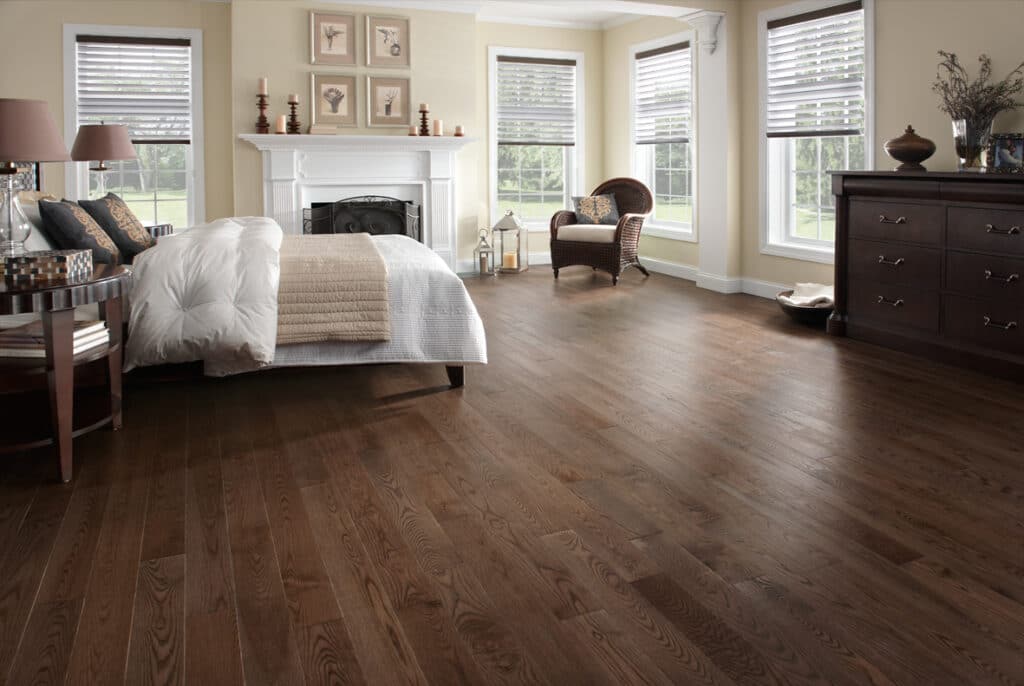
Hardwood Flooring
Hardwood flooring is extremely popular because it’s beautiful, traditional, and adds value to a property. Similar to carpeting, hardwood flooring retains heat which is what you want for an everchanging climate. Wood floors do take a bit more time and money to maintain but are a great choice for your Denver home if maintained properly.
If you’re in need of some new flooring in your Denver home, please contact us! We offer free consultations to new customers and would be happy to recommend the perfect flooring for your home.
Non-Slip Flooring Options for Your Home
While deciding on the type of flooring to get for your home, it’s important to consider non-slip flooring for areas with high-traffic or that frequently get wet. This is especially true if you have kids or seniors living in your home.
Here are three non-slip flooring options along with what rooms they work well in and a full list of their benefits.
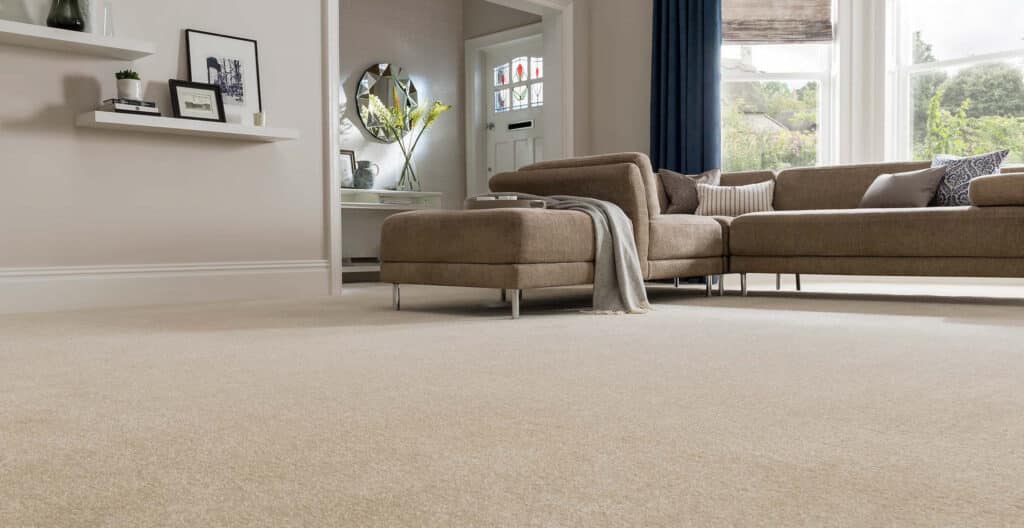
Carpet Flooring
The most popular type of non-slip flooring is carpeting, a classic choice for living rooms, bedrooms and stairs. No matter the length of the carpet fibers, this is the best non-slip flooring option on the market. If you are afraid of falls, carpeting is the safest choice because of the padding underneath.
Benefits of carpet flooring:
- Low cost
- Sound absorption
- Temperature control
- Countless pattern and texture options
- Comfortable
If you have a family member with a walker or wheelchair, we recommend opting for one of the flooring options below for high-traffic areas.
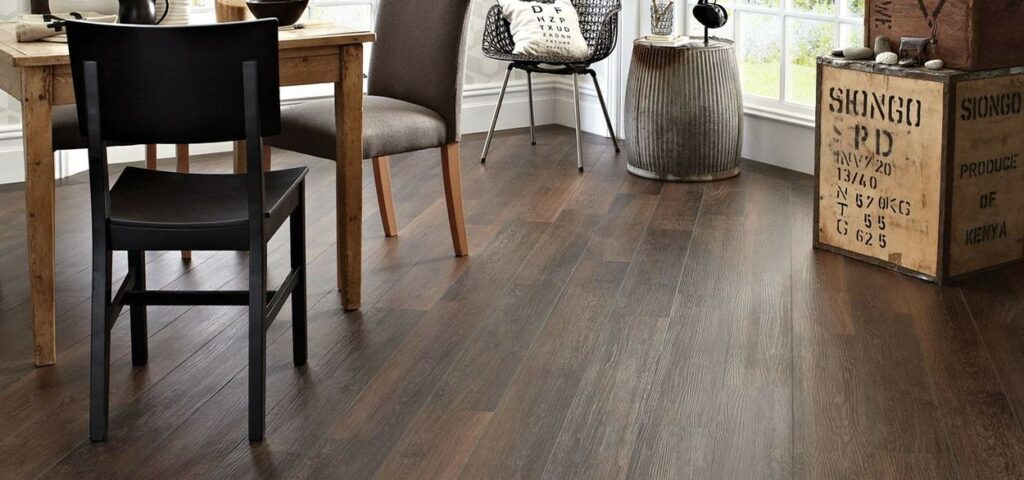
Vinyl Flooring
Not all vinyl flooring is non-slip, but there are quite a few types of vinyl that are textured with a matt finish like the floor shown above. This makes for a great non-slip surface even when wet. For a home owner that is a senior or always busy, this is a great option because it is easy to clean and very resilient. Vinyl flooring is great for the kitchen, entryway, living room, mudroom, laundry room, and bathroom.
Benefits of vinyl flooring:
- Easy to maintain
- Water resistant
- Durable
- Countless design options
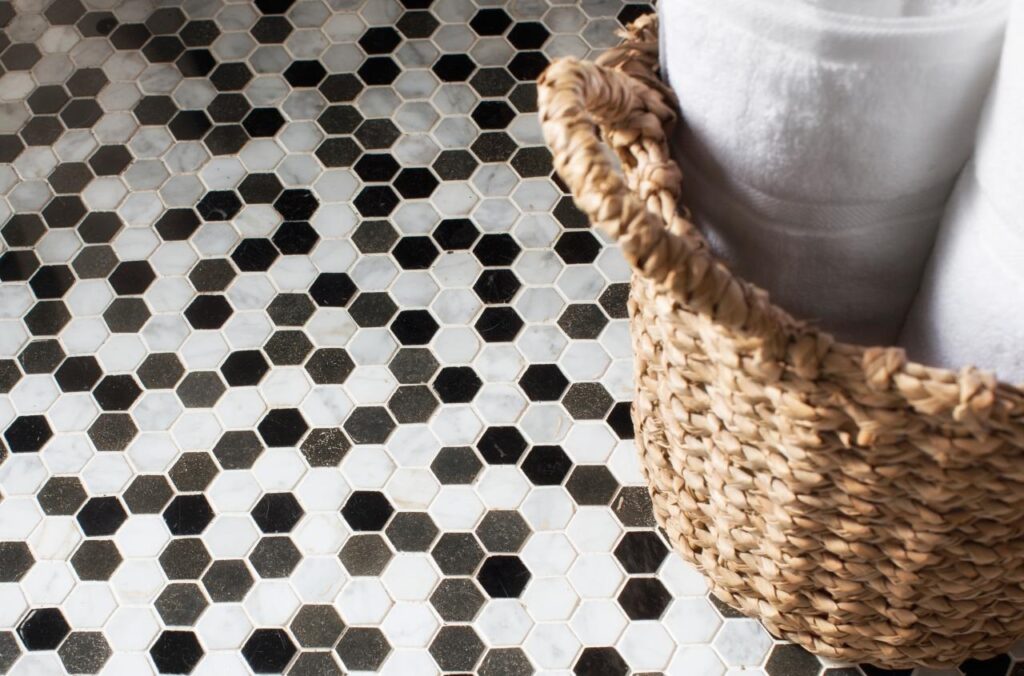
Ceramic Tile Flooring
Though tile floors can be very slippery, small ceramic tiles have more grout lines and thus more traction. For the best non-slip tile floor, opt for small, textured tiles. Ceramic tile is much easier to clean and maintain than natural stone and is a great choice for your bathroom and laundry room.
Benefits of ceramic tile flooring:
- Easy to maintain
- Durable
- Water and stain resistant (when sealed)
- Great for homes in a warm climate
- Countless design options
Bonus tip: place rugs with non-slip rug pads in places where slipping typically occurs, like the bottom of a staircase, inside/outside of doorways and in bathrooms.
If you’re in need of non-slip flooring for your Denver home or business, please contact us! We offer free consultations to new customers and would be happy to recommend the perfect flooring based on your wants and needs.
Got leftover carpet from your home renovation project? Carpet remnants can go a long way in providing practical uses for your home or fixing a simple problem. They can be used in some pretty creative, practical ways around the house, such as sensory boards for kids, pet beds, or these other 12 great ideas below.

#1: Cushion for the pet crate
Animal experts say crates are one of the most successful ways to potty train your pet. A little cushy carpet inside the crate makes it a cozy home, and you can add carpet under the crate to prevent scratches and dents on your floor.
#2: Make a cat scratching post
Speaking of animals, use leftover carpet to make a scratching post for your cat. Go above and beyond by making a cat tree!
#3: Under the washing machine
Slip a few pieces under the feet of your washing machine to keep the noise down in the laundry room.
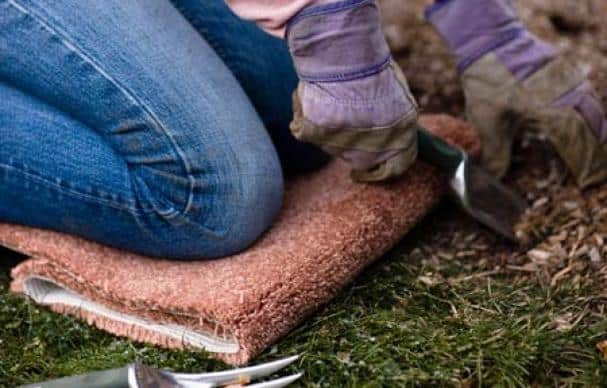
#4: In the garden
Save your knees-in the garden or anywhere else you use a little elbow grease with some rolled-up carpet remnants.
#5: Move heavy furniture
Moving furniture across hard surfaces? Slip carpet remnants under the furniture, pile side down, and push it across the floor.
#6: Soundproof a music room
Using leftover carpet remnants to soundproof a music room is effective and inexpensive. You can put carpet on the walls and even the ceiling to keep the sound down for everyone in the house and your neighbors.
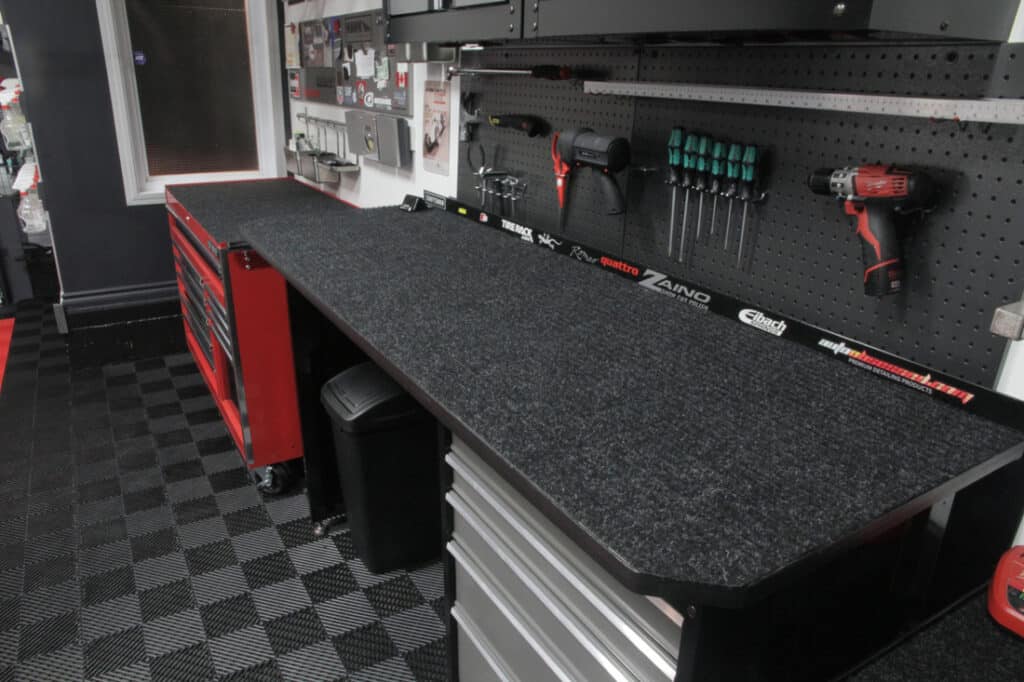
#7: Enhance your furniture
Use carpet remnants as a topper for a piece of furniture such as a mudroom bench, or use rolled-up pieces of carpet as a unique way to make a cushion.
#8: Donate it to local animal shelters
Our favorite leftover flooring idea: Give it to a shelter and improve the lives of the “residents” there.
#9: Cover a workbench
Use leftover carpet to make a protective cover for your home workbenches and make them last longer. If your workbench has a metal surface, this will make it non-slip.
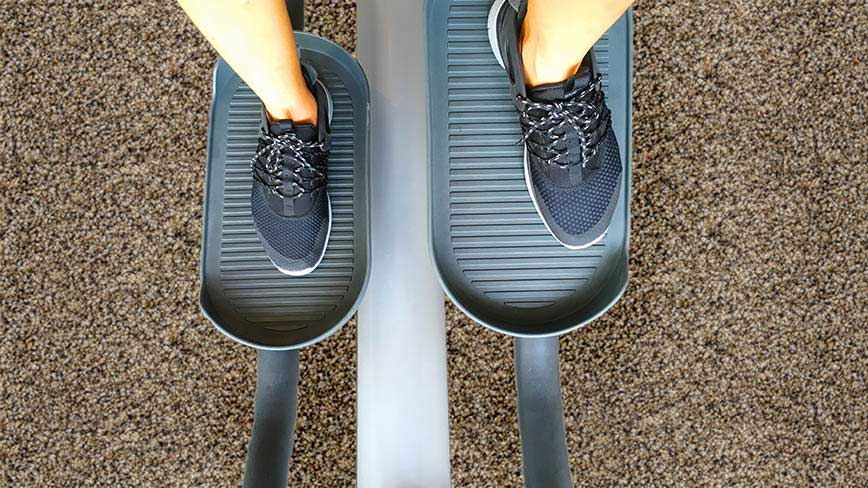
#10: Support exercise equipment
Place carpet remnants under exercise equipment, such as indoor bike trainers, weight benches, and elliptical machines, to help prevent indentions in your existing carpet.
#11: Extra protection in storage bins
Use carpet in your storage bin for an added layer of protection for all your favorite fragile things, from holiday ornaments to family keepsakes.
#12: Tire traction in the snow
Stash a few carpet remnants in the trunk of your car to put under the tires if you or a friend’s car gets stuck in the snow. You never know when you’ll need it!
Do you need new carpet flooring in your Denver home or business? Contact us today! We offer wholesale flooring so you can be sure you’re getting the best product at the best price.
With regular care and preparation, you can protect your investment and keep your carpet looking great for as long as possible. Below we’ve listed our top 4 carpet maintenance tips to extend the life of your carpet flooring.
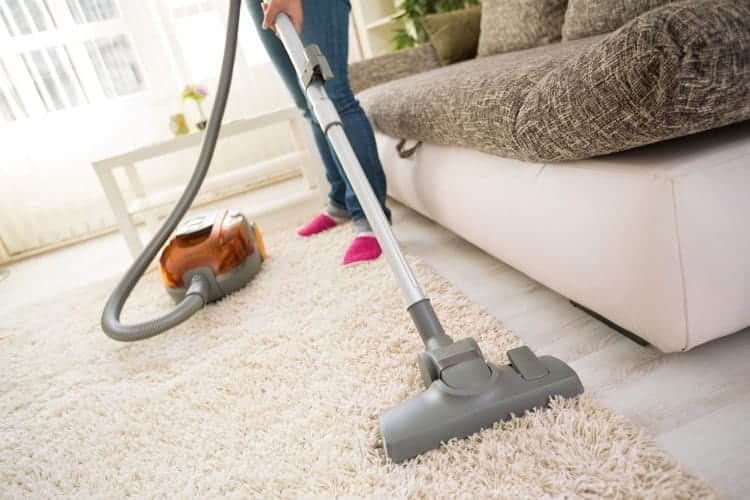
#1: Vacuum often
Getting in a good vacuuming habit is one of the best ways to extend the life of your carpet flooring. When you keep the dirt and dust that settles on the surface of the carpeting to a minimum, there will be less dirt that penetrates the padding underneath which can only be removed with a carpet cleaner.
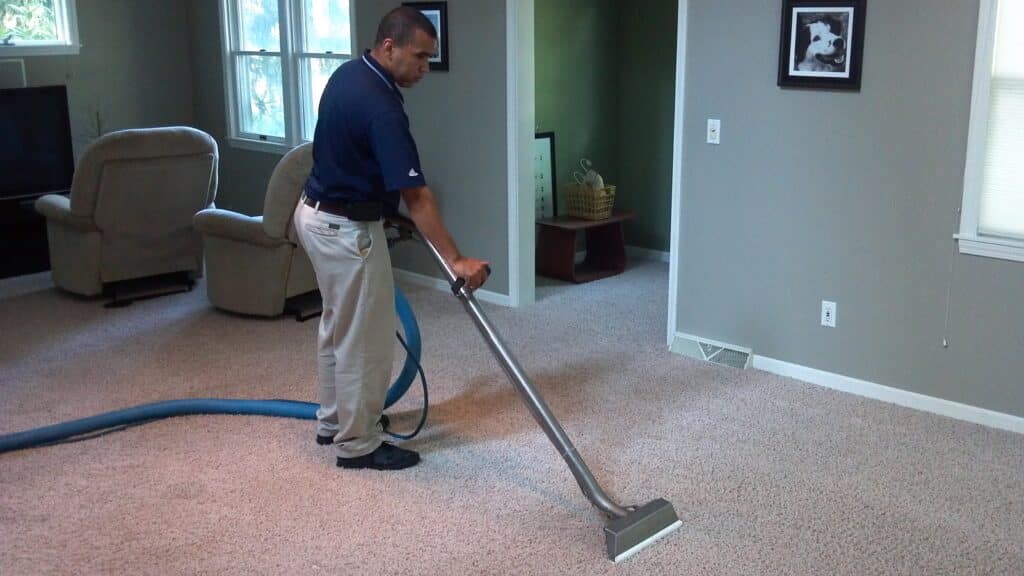
#2: Don’t just vacuum to clean carpets
There’s a reason professional carpet cleaners exist! Even with frequent vacuuming in high traffic areas of your home, there are some things only a carpet cleaner can remove. We recommend getting your carpet professionally cleaned every 12 to 18 months.
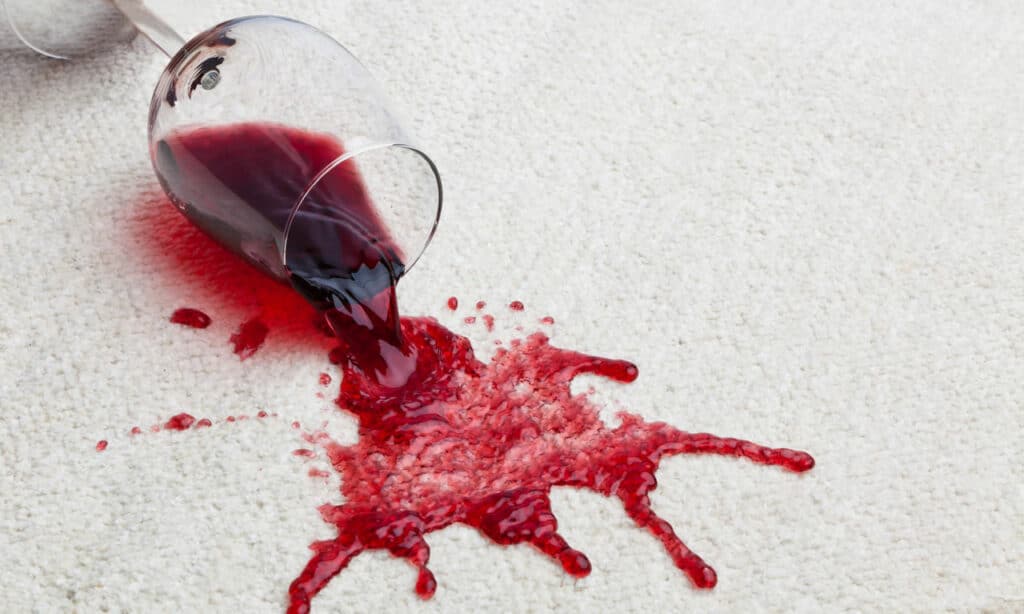
#3: Clean stains quickly and always be prepared
There’s nothing worse than finding out you need to go to the store to get the right product to remove the new stain on your carpet. It’s always important to have one or two carpet cleaning solutions on hand. We recommend keeping a strong carpet stain remover on-hand or using white vinegar and baking soda. Check out our carpet stains article for more detailed information on how to remove the five most common carpet stains.
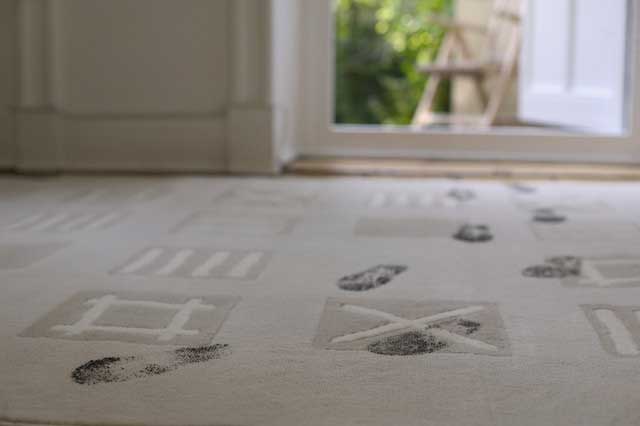
#4: Keep shoe traffic to a minimum
Shoes can track in all sorts of things from the outside world. Get in a good habbit of taking off your shoes as soon as you enter the house or before walking on carpet. If you don’t like walking around without shoes, purchase a pair of slippers just to be worn indoors.
Do you need new carpet flooring in your Denver home or business? Contact us today! We offer wholesale flooring so you can be sure you’re getting the best product at the best price.
Laminate flooring continues to grow in popularity, but many are still skeptical that laminate can hold up to normal wear and tear. It is true that laminate flooring was not very durable or easy to repair when it was initially produced in 1977. Fortunately, laminate flooring has come a long way since then.
From cleanliness to appearance, let’s take a look at the top 4 laminate flooring myths.
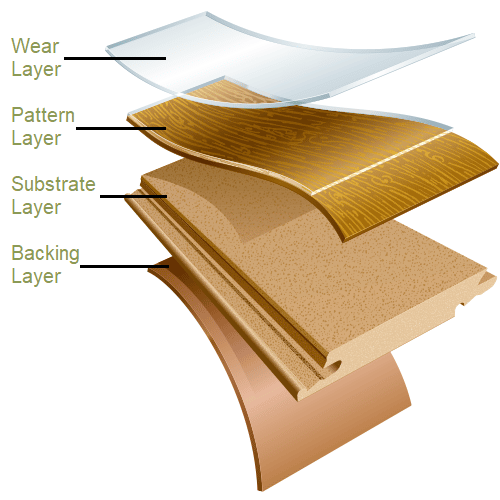
#1: Laminate flooring is not durable
One of the most common myths about laminate flooring is that it is not durable. That might have been true when it was first produced, but today that is not the case. Each laminate flooring panel consists of at least four layers, including a wear layer that protects the floor and makes it durable. With this wear layer along with proper care, laminate floors are very durable and can last up to 25 years.
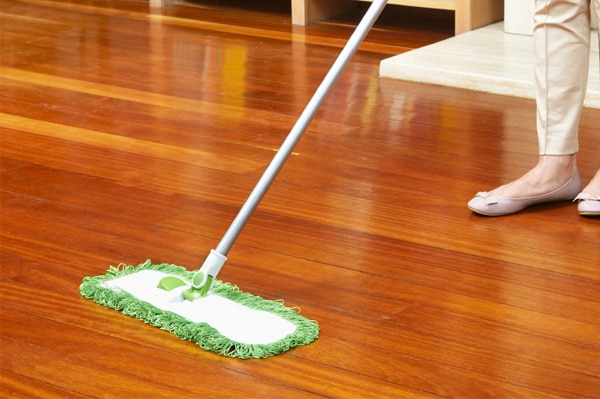
#2: Laminate flooring is hard to clean
Laminate flooring is easier to clean than tile and wood flooring. Because of the wear layer, most substances do not penetrate the pattern layer leaving a stain. Each panel is very tightly installed so there is no seam to catch debris like you get with wood flooring. You can easily keep your laminate floor clean with habitual sweeping and damp mopping.
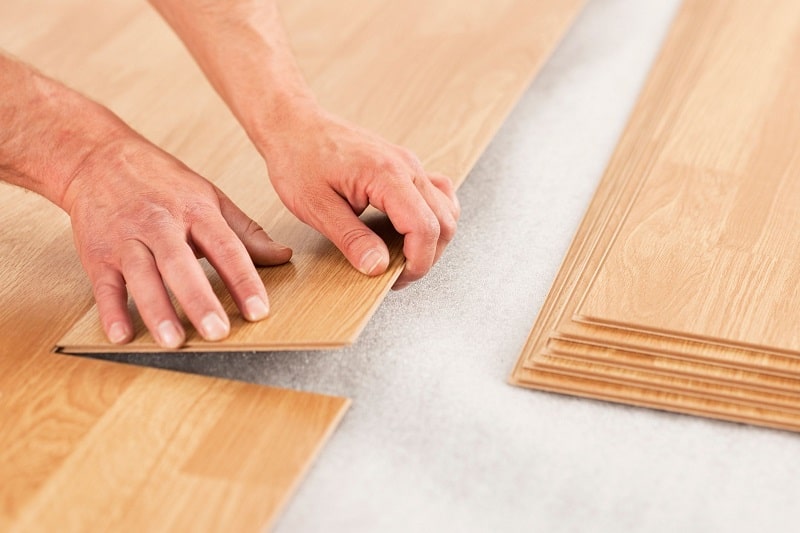
#3: Laminate flooring cannot be repaired
Repairing laminate flooring is extremely easy and inexpensive. Because laminate flooring is installed in planks, you just have to replace the damaged plank.
If the damage is small enough, some scratches and scuffs can be fixed with a repair kit. Check out the Picobello Repair Kit or Ram-Pro Markers for minor touch-ups.
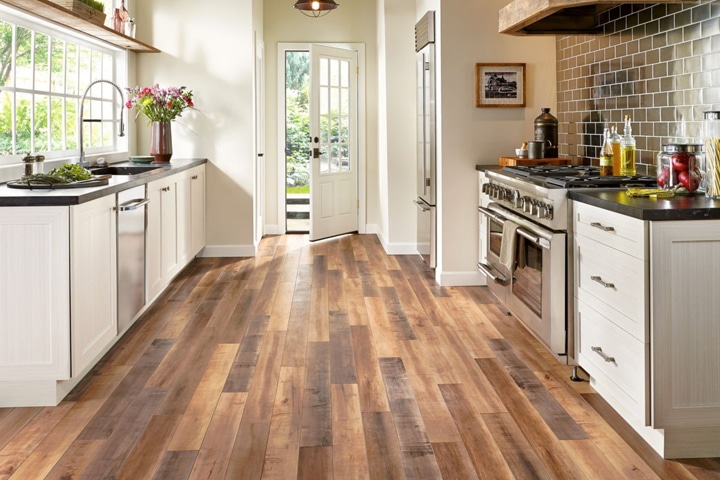
#4: Laminate flooring looks cheap
While laminate flooring is an inexpensive flooring option, it has come a long way since its initial design. There are so many different designs, patterns, and even textures to choose from that it can be hard to tell whether it is hardwood or vinyl flooring.
Feel free to schedule an appointment at one of our two locations in the Denver Metro Area if any of these myths are still a concern.
Does your Denver business or home need new flooring? Contact us today to take advantage of our unbeatable wholesale prices.
Luxury Vinyl Tile: Narrowing Your Choices
You’re convinced luxury vinyl flooring is perfect for your Denver home, but how exactly do you want your floor to look? You have decisions to make, from the design of your new flooring to how it’s installed. We are here to help. Here is what to consider for your options:
Design: wood vs. stone
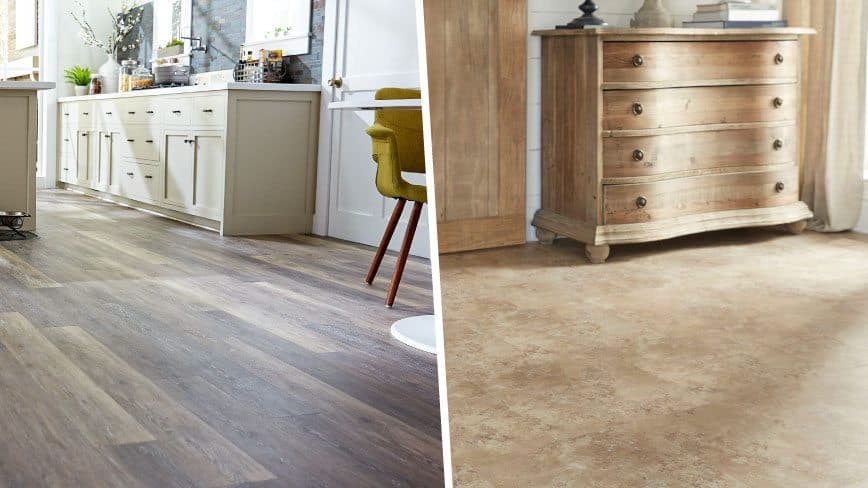
Luxury vinyl flooring closely mimics the appearance of wood or stone. Deciding between the two is mainly based on personal taste and inspiration, and in what room you want the flooring.
A wood design offers a warm, relaxed feel, and is great for living spaces like family rooms, dining rooms, kitchens, and bedrooms. Stone can give you a bit of a spa feel, and works well in entryways, bathrooms, and laundry rooms. Both designs are completely waterproof vinyl flooring.
Shape and size: planks vs. tiles
Deciding between a wood or stone look will help lead you to what shape you want for your luxury vinyl flooring: planks or tiles. Most of the luxury vinyl flooring planks create the illusion of real hardwood, but there are a few plank options that look like stone. The tiles all mimic stone.
Planks can be put down in staggered designs, random patterns, and even diagonals (though they look best when lying parallel to the longest walls in the room). You can lay tiles in any fashion, with popular options being point-to-point and ashlar (brick) patterns.
Another option to consider is what size you want your luxury vinyl flooring plank or tile to be. Tiles can be square or rectangular. Planks are rectangular and come in different widths and lengths. Pro tip: bigger planks can mean fewer seams on the floor.
Installation: loose-lay vs. direct glue down vs. click-to-lock
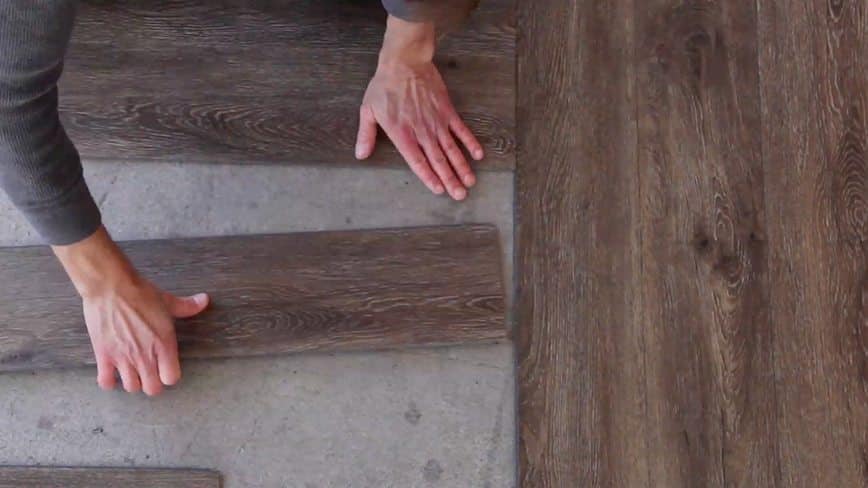
Luxury vinyl flooring is easy to install using any of its three methods. The best installation type for you depends on a variety of factors, including what floor you are covering, how easy you want the installation, and how much the temperature fluctuates in your home.
Click-to-lock: The luxury vinyl flooring planks and tiles float above the subfloor with this installation method. Instead of using an adhesive, click-to-lock flooring has grooves and tongues on its edges to allow for easy interlocking. Click-to-lock offers room for your floor to move slightly with temperature changes and can hide imperfections in the subfloor. It’s the only option if you want to use your floor immediately after installation.
Direct glue-down: An adhesive is always used here to attach the flooring to the subfloor, allowing for different patterns. You can also use grout for a different look. There is less room for movement due to temperature change.
Loose lay: This type does not rely on interlocking grooves or adhesive (though it can be glued or grouted based on the type of installation). Instead, it has an anti-slip layer on the bottom of the flooring to help it stay in place on the subfloor. Installation is mess-free, and it can be easily removed and replaced.
Does your Denver business or home need new flooring? Contact us today to take advantage of our unbeatable wholesale prices.
5 Common Carpet Stains and How to Remove Them
If you have carpet flooring in your home, chances are you will have to deal with an unwanted stain. No matter the culprit, it’s important to know what to do right away so the stain doesn’t become permanent. Below we have listed 5 common carpet stains along with an easy way to remove them. Because time is so critical when working with stains, each method only requires common household products.
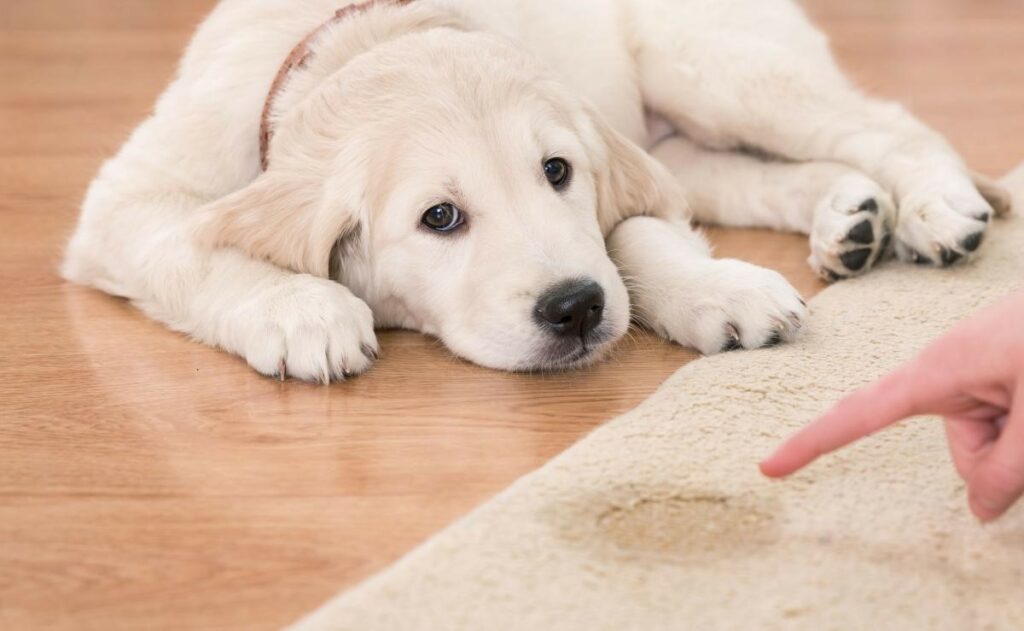
1. Pet Stains
What you need: paper towels, white vinegar, baking soda, water, cloth, and a spray bottle (optional)
- Blot dry with paper towels
- Mix 1 cup of warm water, 1 cup of white vinegar and 2 tablespoons of baking soda
- Pour mixture into a spray bottle and thoroughly spray the stain (no spray bottle? Slowly pour the mixture over the stain and make sure not to use too much)
- Let sit for 5 minutes
- Gently rub the stain with a cloth and blot dry

2. Wine/Juice Stains
What you need: paper towels, baking soda, water, cloth, and a vacuum
- Blot the stain with paper towels and do not rub
- Apply a small amount of cold water and continue blotting with a cloth (do not spray)
- Repeat until no more of the stain will come out
- Make a paste with 3-parts baking soda and 1-part water
- Apply to stain and let dry
- Vacuum the dried paste slowly from each direction

3. Dirt Stains
What you need: mild dishwashing detergent, water, two cloths, and a vacuum
- If wet, let dry
- Remove as much dirt as possible by vacuuming slowly from each direction
- Mix 1 cup of warm water with 1 teaspoon of mild dishwashing detergent
- Apply mixture to stain with a white cloth
- Blot dry with second cloth
- Repeat until stain is gone

4. Blood Stains
What you need: mild dish soap, water, two cloths, and a spray bottle (optional)
- Blot dry with paper towels
- Mix 1 cup of cold water with 1/4 teaspoon of mild dish soap
- Apply mixture to stain with a white cloth
- Let sit for 5 minutes
- Blot dry with second cloth and do not rub
- Spray area with cold water (or lightly pour), blot dry and repeat until stain is gone
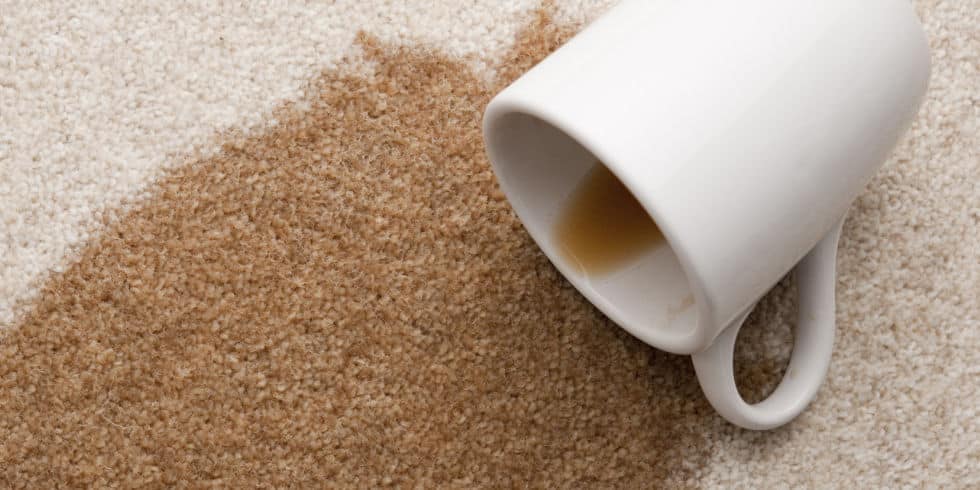
5. Coffee Stains
What you need: mild dish soap, white vinegar, water, two cloths, and a spray bottle (optional)
- Soak up the remaining moisture with paper towels
- Mix 2 cups of warm water, 1 tablespoon of mild dish soap and 1 tablespoon of white vinegar
- Apply mixture to stain with a white cloth
- Blot dry with second cloth and do not rub
- Spray area with cold water, blot dry and repeat until stain is gone
Do you need new carpeting in your home? Contact us today! We offer stain-resistant carpeting so that cleaning accidents like these is a breeze.
The Importance of Carpet Durability
Helping you live more comfortably in your home means making sure our carpets live up to some high standards. Carpet manufacturers have done tons of laboratory testing and real-life research on both wear & tear and most common household soils, spills and stains. That helps us give you carpet that stands up to what your family dishes out. Your carpet will clean easily and stay looking fresh.
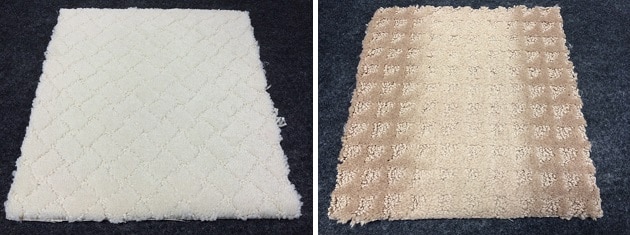
Soil Resistance
Everyday life soils carpets, and over time, the durability of a carpet may be seen in the ability to handle soiling. Images below show the change in carpet color due to soiling after an estimated 5 years of use.
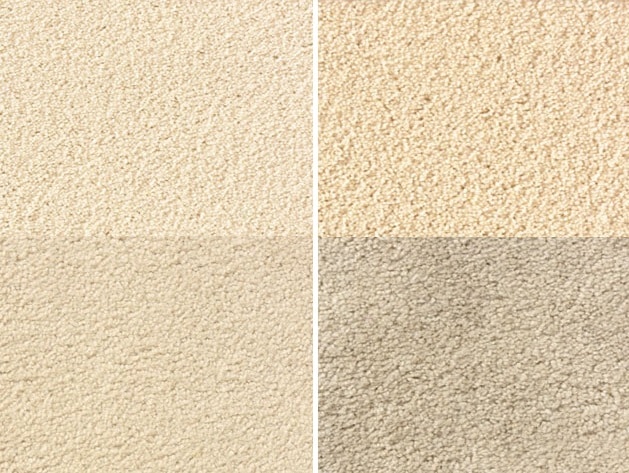
Stain Resistance
Carpet that stands up to stains when thoroughly rinsed with water – that’s durability!
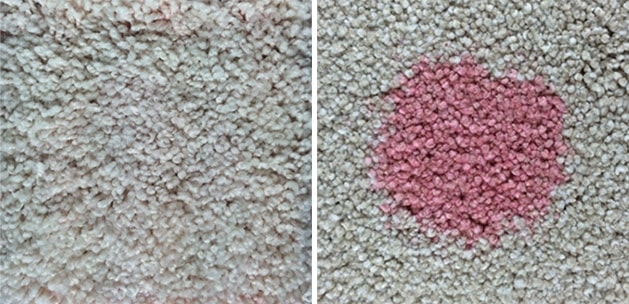
Do you need new carpeting in your home? Contact us today! We offer stain-resistant carpeting so you can have durable carpet like this in your home.
3 Common Vinyl Stains and Scratches, and How to Remove Them
If you have vinyl flooring in your home, chances are you will have to deal with an unwanted scratch or stain. No matter the culprit, it’s important to know what to do so the noticeable mark doesn’t become permanent. Below we have listed 3 common vinyl stains and scratches along with the best way to remove them with common household items.
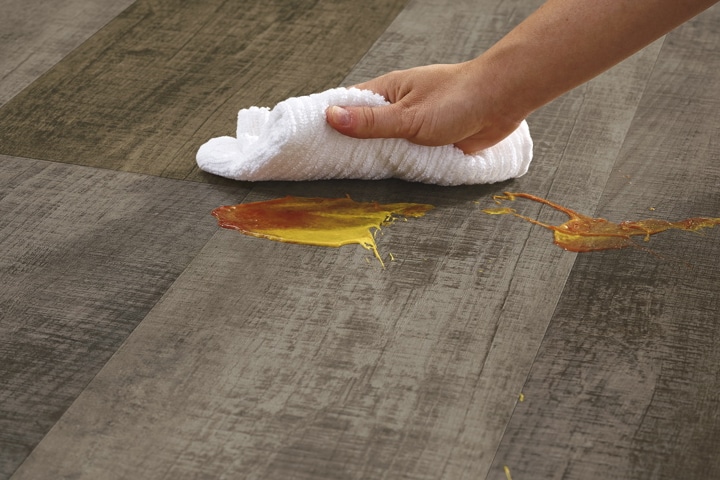
1. Foods & Beverages
- Wipe all spills up quickly.
- Use neutral pH cleaner solution.
- White, soft bristle brush can be used on heavy deposits.
- User blue or white scrub pad, if needed.
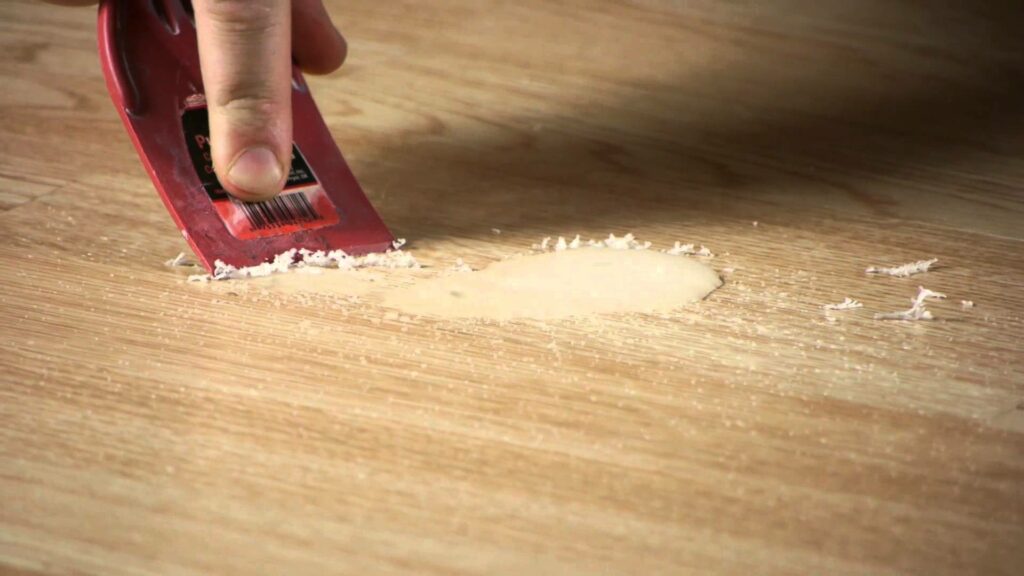
2. Asphalt, Grease, Oil, Paint, Tar & Wax
- Carefully remove deposits with dull plastic putty knife.
- Use flooring stripper solution to clean residue from surface.
- Dried deposits may require a small amount of mineral spirits applied with a clean, white cloth. DO NOT pour mineral spirits directly on the surface of the vinyl.
- Rinse thoroughly with clean, wet cloths and neutral pH cleaner.
- Blue or white scrub pads can be used on residue.
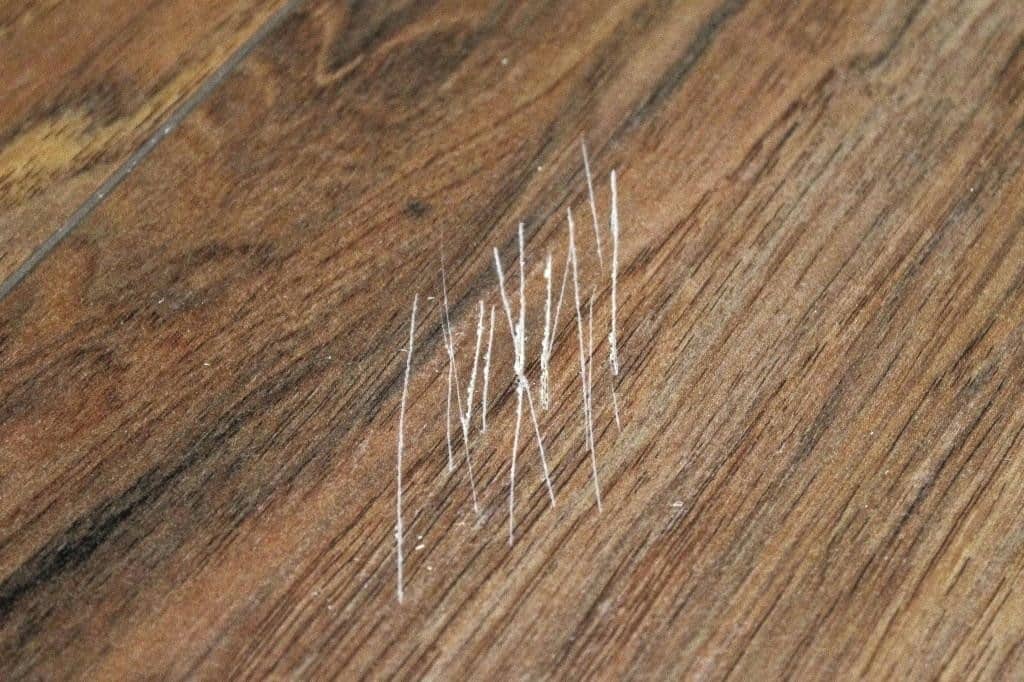
3. Scuffs & Scratches
- Clean floor with stripper solution and use blue or white scrub pad if needed.
- Use a neutral pH cleaner to clean the floor and remove any residue.
- If floor is scratched, use of an after market finish may lessen the effect of the scratches. Only use finishes that are compatible with urethane coatings.
Do you need new flooring in your Denver home or business? Contact us today! We offer a wide variety of durable vinyl flooring so you can clean accidents like these in a breeze.
Consumer Alert: Denver Metro Area
Take note. These flooring industry scams are intended to defraud unwary buyers and have recently turned up in the Denver metropolitan area.
Whole House Install For Less Than $100
Don’t be fooled—there is no free lunch in the flooring industry. If a store advertises the installation of your carpet for one low price, it’s likely that cost will be recovered through an ‘up charge’ on the cost of the pad and carpet to cover the cost of installation. Do you really think that a trained and talented carpet installer would work for free?
Look for hidden costs in the fine print. Some special pads may exceed $8.00 per yard. And look for extra charges for items that may not be included such as individual pieces of tack strip that are required to install carpeting properly.
Also, avoid the ‘bait and switch’ where a store advertises whole house carpet, pad, and install for $999 but the product advertised is of such low quality that you would not put it in a dog house. Once they have you on premise, the store will attempt to switch you to a higher priced carpet and install.
The Private Label Ploy
When purchasing a car, buyers are often brand loyal and look for a particular name such as Chevy or Ford, and a particular model. What if car dealers removed the labels and the manufactures produced cars that appeared the same and you weren’t able to distinguish what you were buying. Welcome to the carpet world. This practice is commonplace and makes it very difficult to do apples-to-apples comparison shopping. When a store guaranties the lowest price by 5 or 10 percent, they are often substituting inferior product to help make the sale profitable. We recommend buying through brand name mills.
Fiber Ambiguity
Purchasing an inferior product is easy if you don’t do your homework. If you walk into a carpet store and the sales person does not explain the differences between your product choices, it’s time to leave. Please see our Glossary of Terms in this section of the site to inform yourself of important differences between carpet types, styles and construction. And check out the Videos we have posted on types of fibers and how they perform.
Quality Discrepancies
Many carpet samples have two-to-three grades on each carpet sample board. Make sure you know which style you are selecting and that the same style name is reflected on your invoice. It should also be on the wrapper from the mill when it arrives for installation.
Internet Purchases
It’s easy to find a product on the Internet today at a cheaper price than from a local company. But be cautious with carpeting as Internet purchases can be problematic. Carpeting must be installed by qualified persons and local companies can inspect and correct defects in carpeting while Internet providers can not. If a separate local company is used for installation, there can be finger-pointing when it comes time to take responsibility for issues. Returning carpet to the transport company for return to the mill wrapped properly for shipment can be a daunting task too. Also, there may be additional costs when asking the original installer to pick up the new carpet and support or service can be spotty after you make your payment.
Carpeting is a costly investment for your home. Choose a dealer that can give you the service you need locally—especially if a problem does happen.
3 Low-Maintenance Flooring Options for Your Home
Whether you’re always busy or you have little mess-makers living in your home, having low-maintenance flooring can help reduce your time spent cleaning and stress of a possible stain. Below we’ve listed 3 low-maintenance flooring options at various price points to help you choose the right floor for your home.
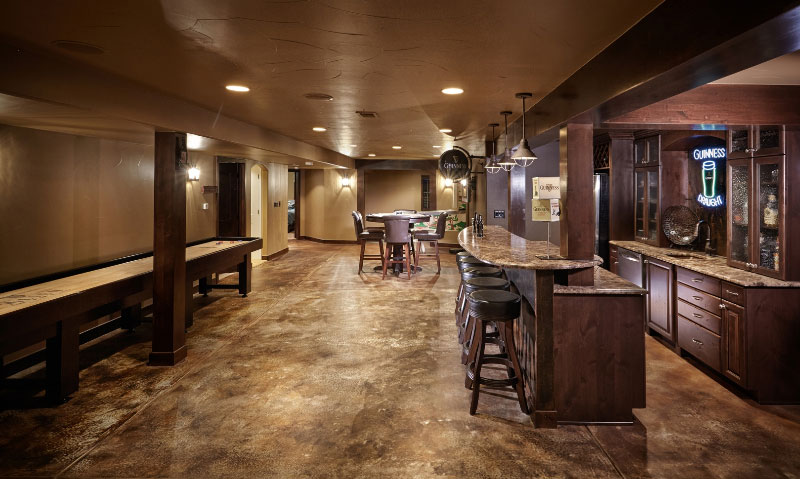
Concrete Flooring
By far the most durable, low-maintenance flooring option is concrete flooring. Though it’s common to see concrete flooring in basements and commercial spaces, concrete flooring is starting to grow into the residential flooring market due to new styles and designs. Concrete floors can be stained, stamped, or even painted to create a beautiful custom floor that’s low-maintenance and very affordable.
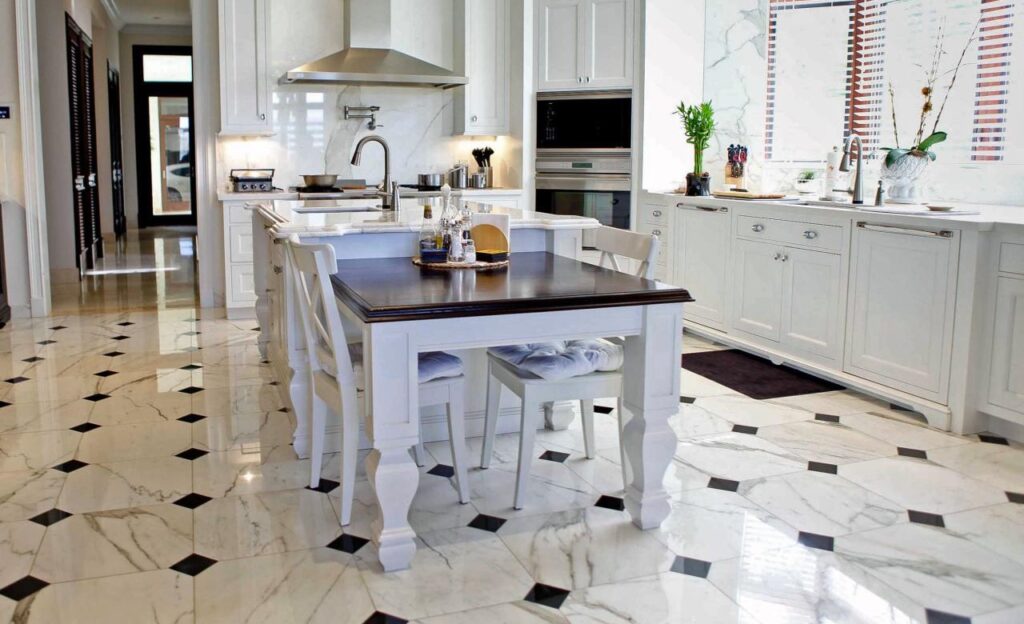
Ceramic Tile Flooring
Ceramic tile has a protective layer that makes this type of flooring waterproof and even stain resistant. Ceramic tile flooring is a more expensive than concrete flooring, but gives you a much wider variety of shapes, sizes, and color options. Due to its durability and rigidity, ceramic tile is perfect for kitchens and bathrooms. More info…
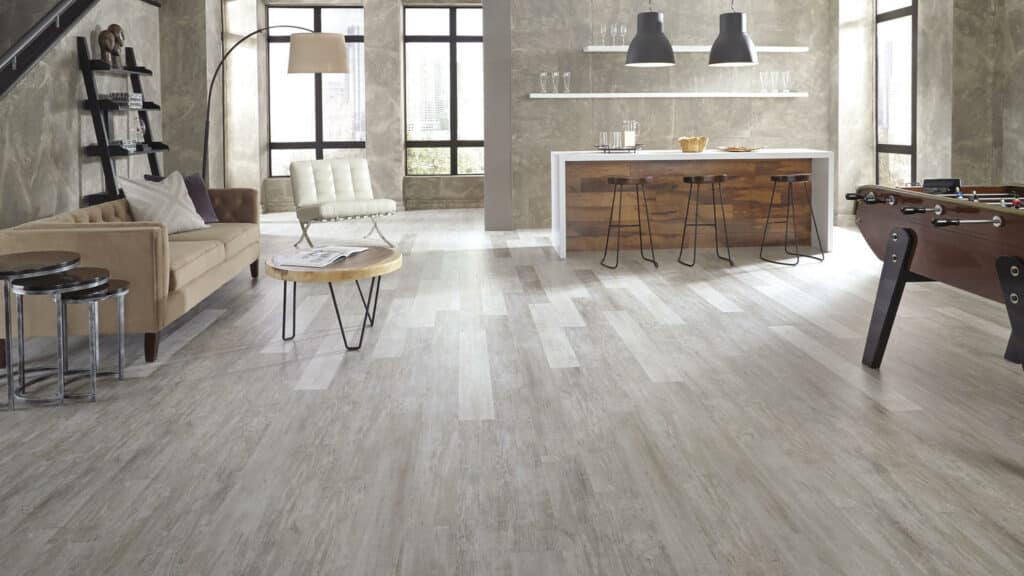
Luxury Vinyl Tile (LVT) Flooring
Of these three low-maintenance flooring options, LVT requires the most maintenance, but still not much. It is water and stain resistant and combines the durability of ceramic tile with the cost-effectiveness of vinyl flooring. LVT is also very lightweight, making it great for almost every space in your home. More info…
Do you need new flooring in your Denver home or business? Contact us today! We offer wholesale flooring so you can be sure you’re getting the best product at the best price.

